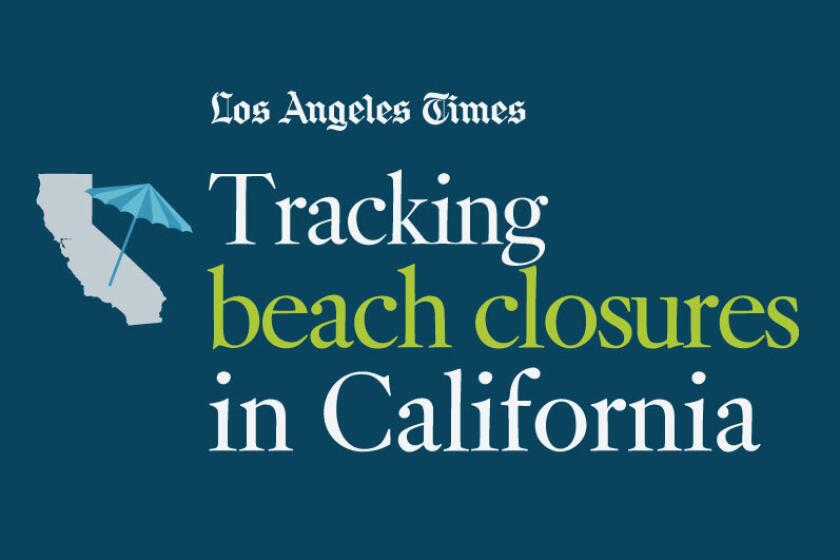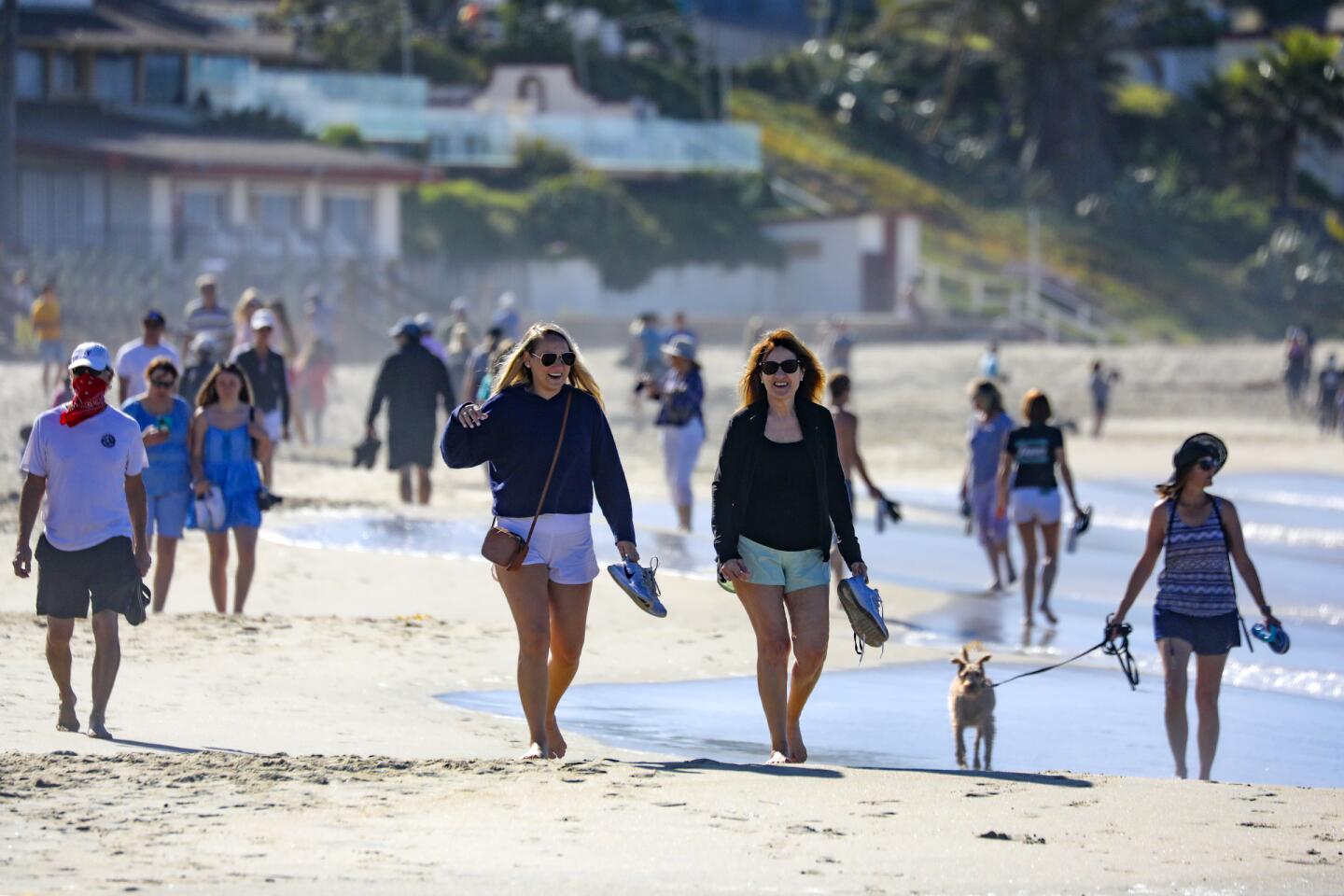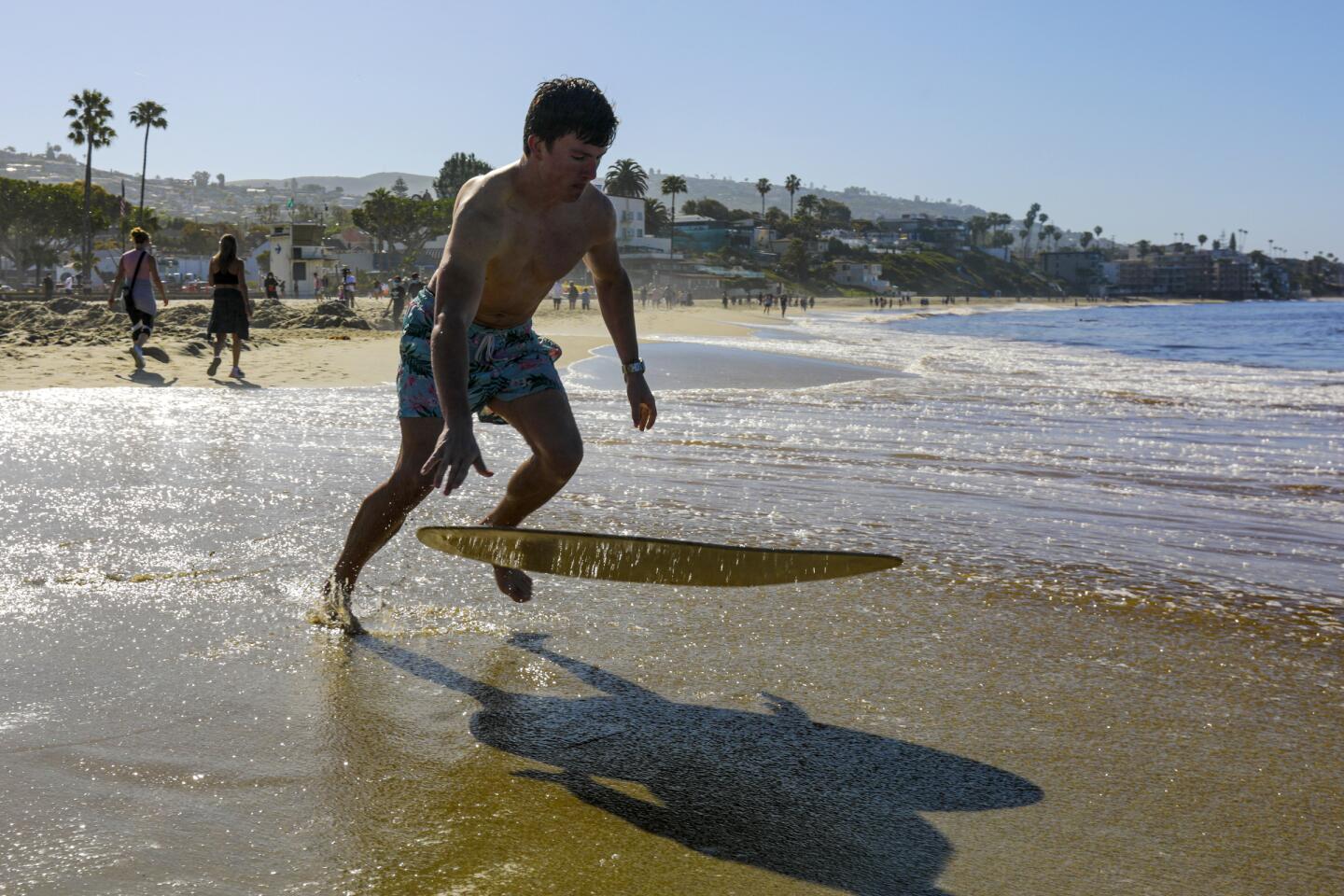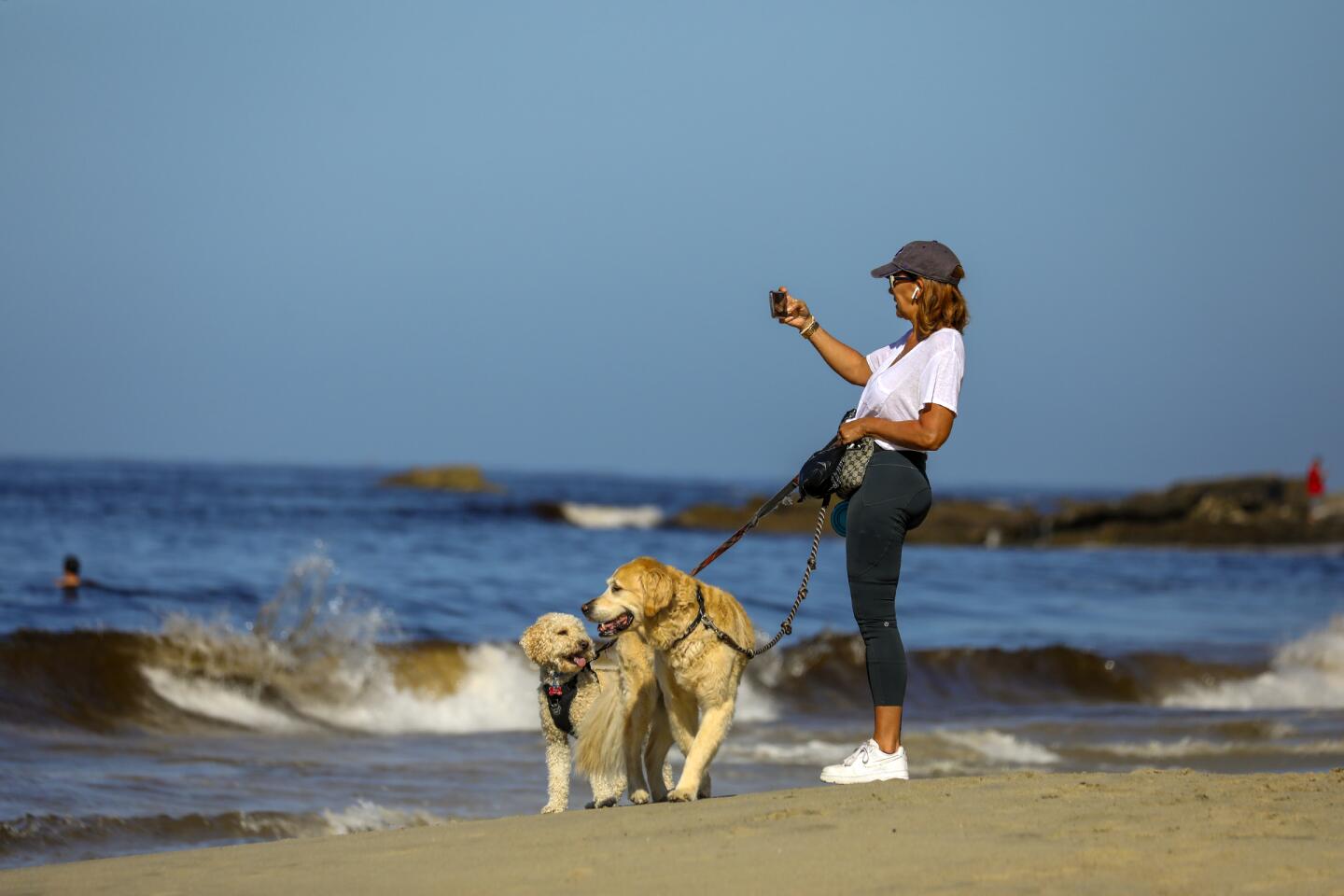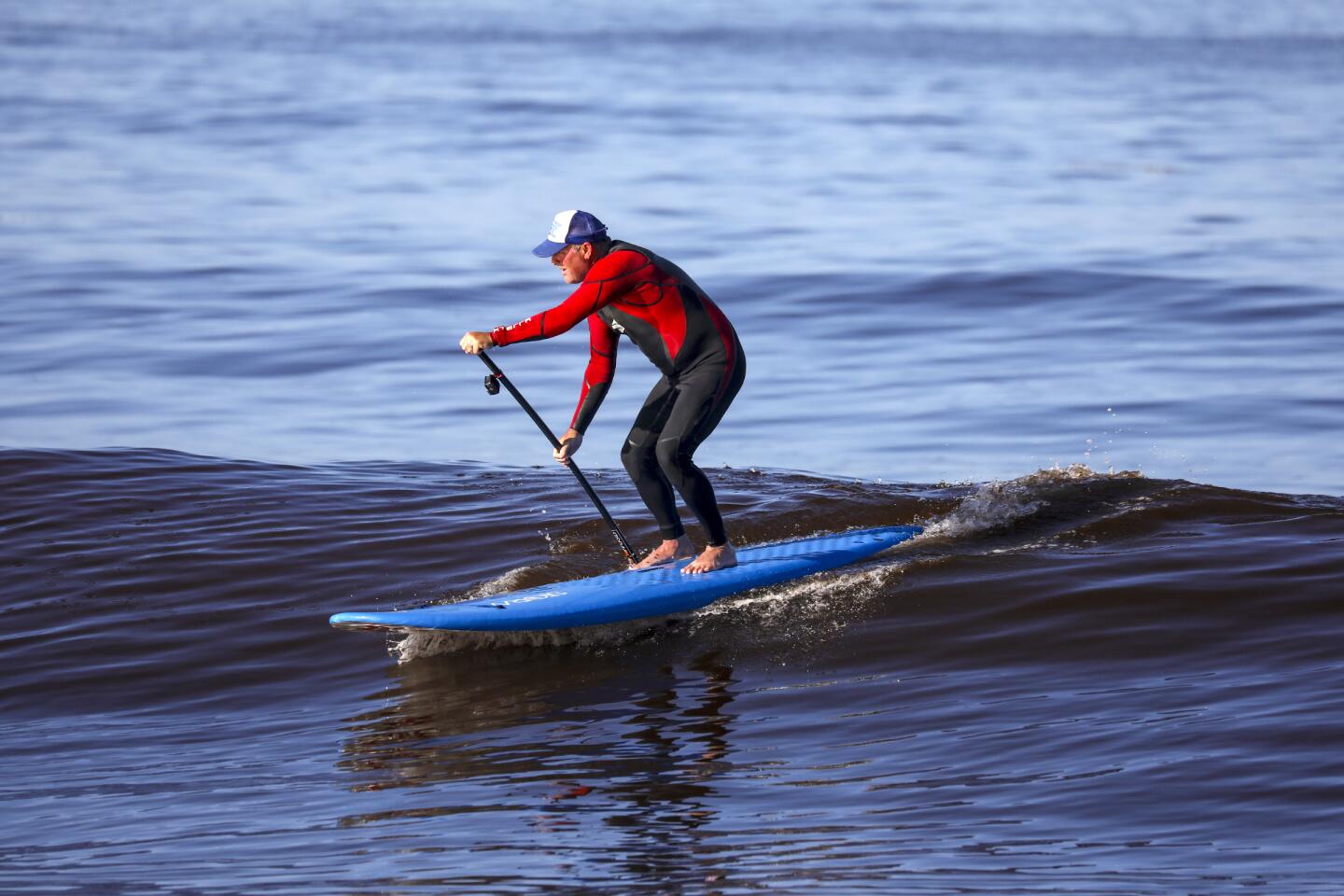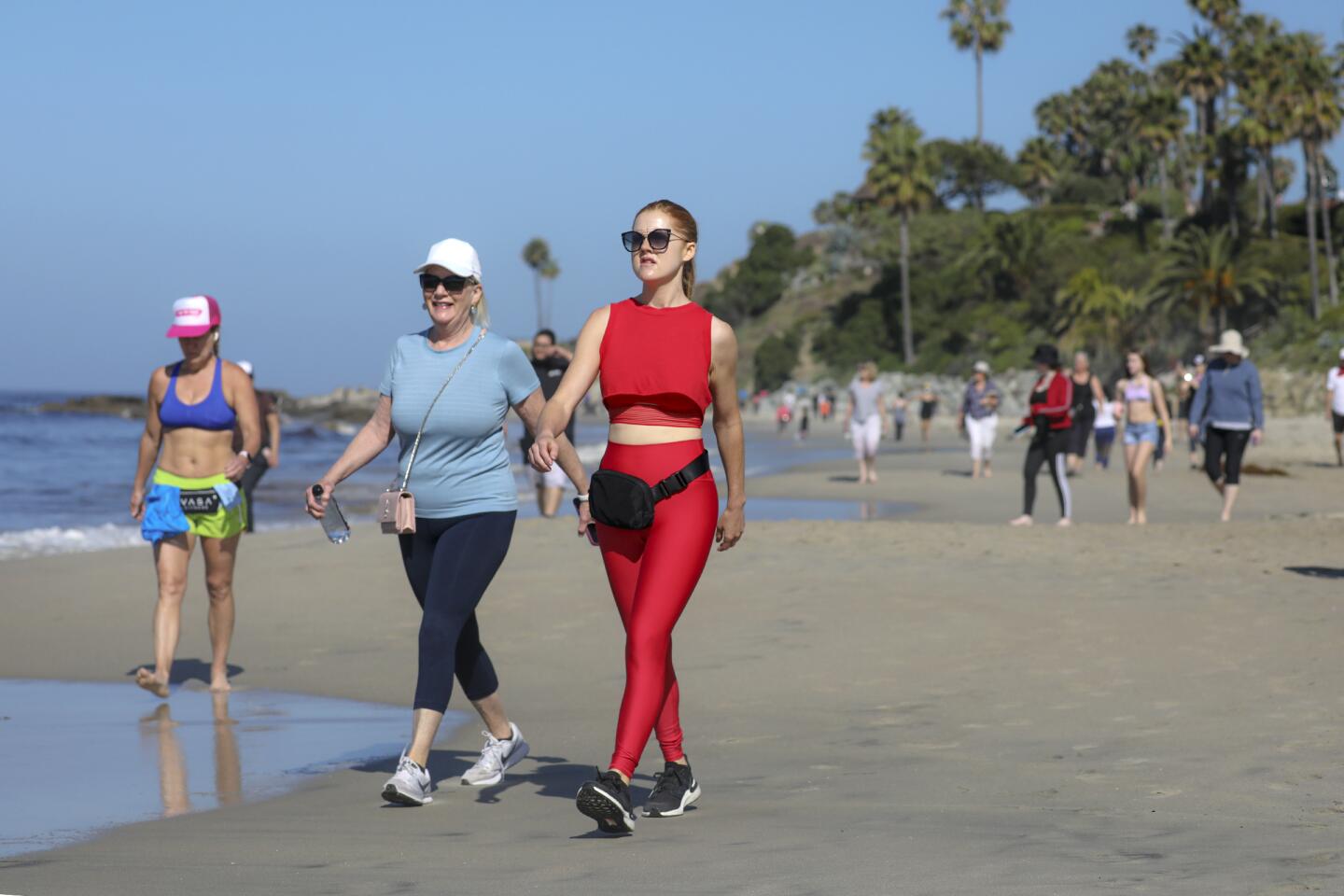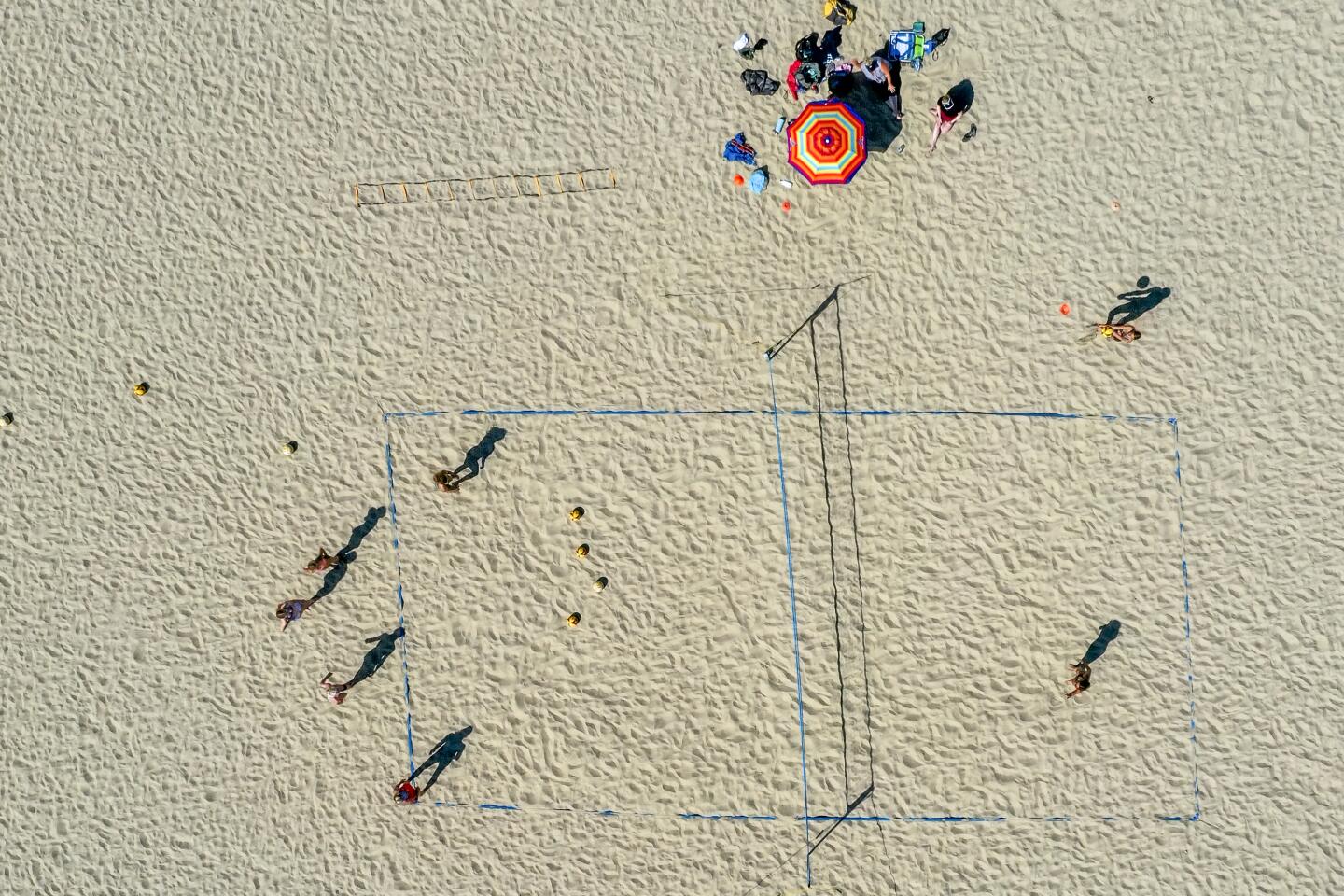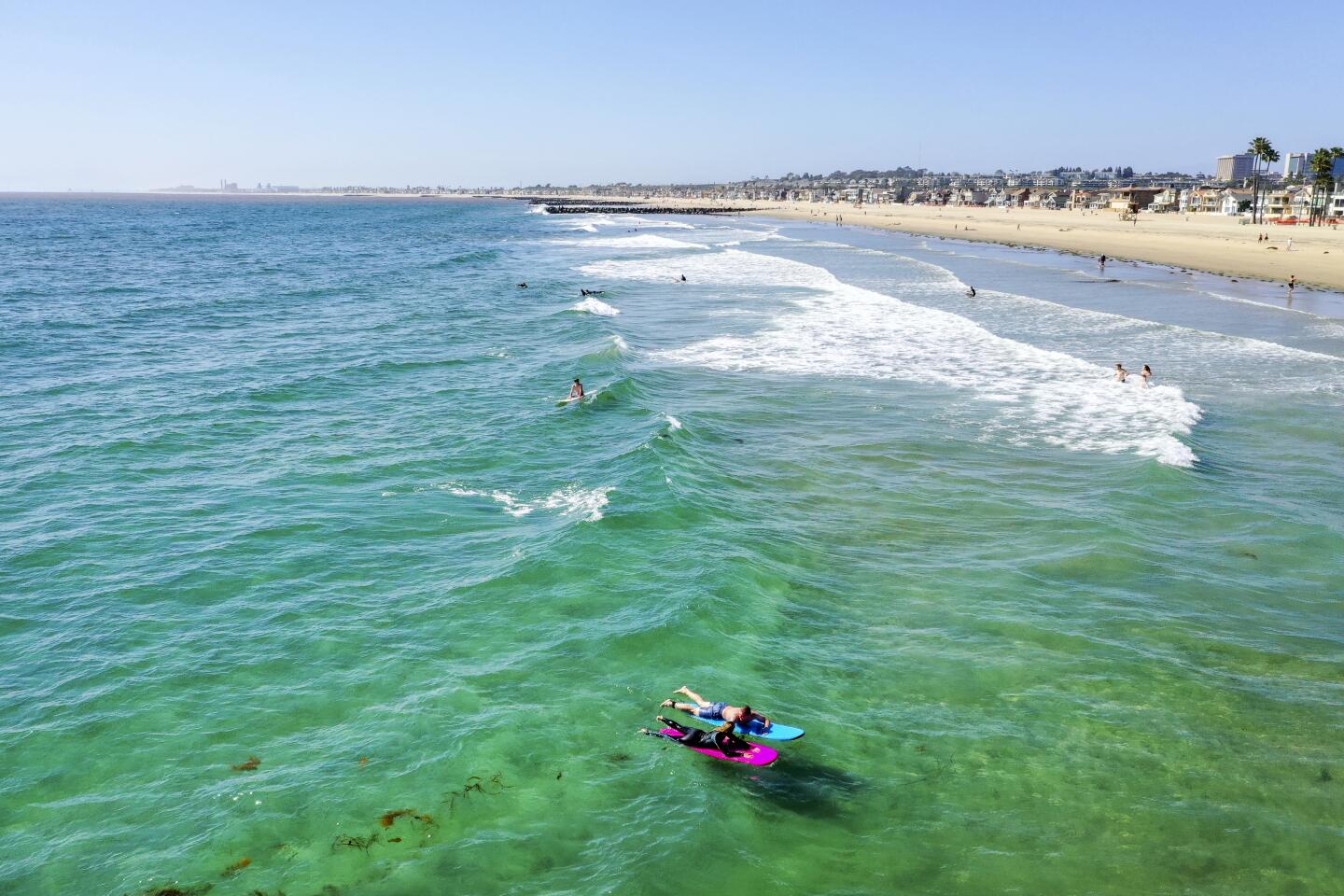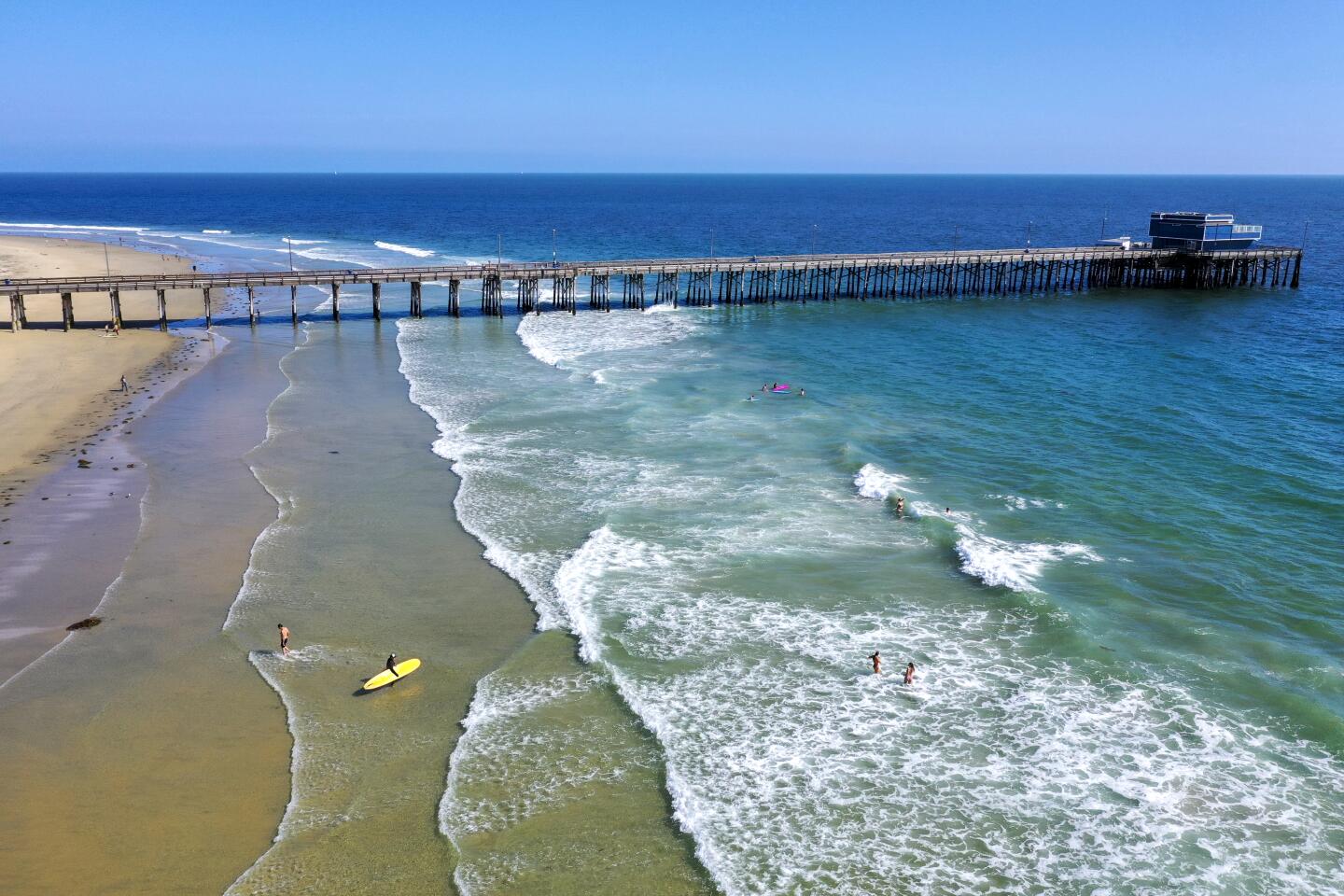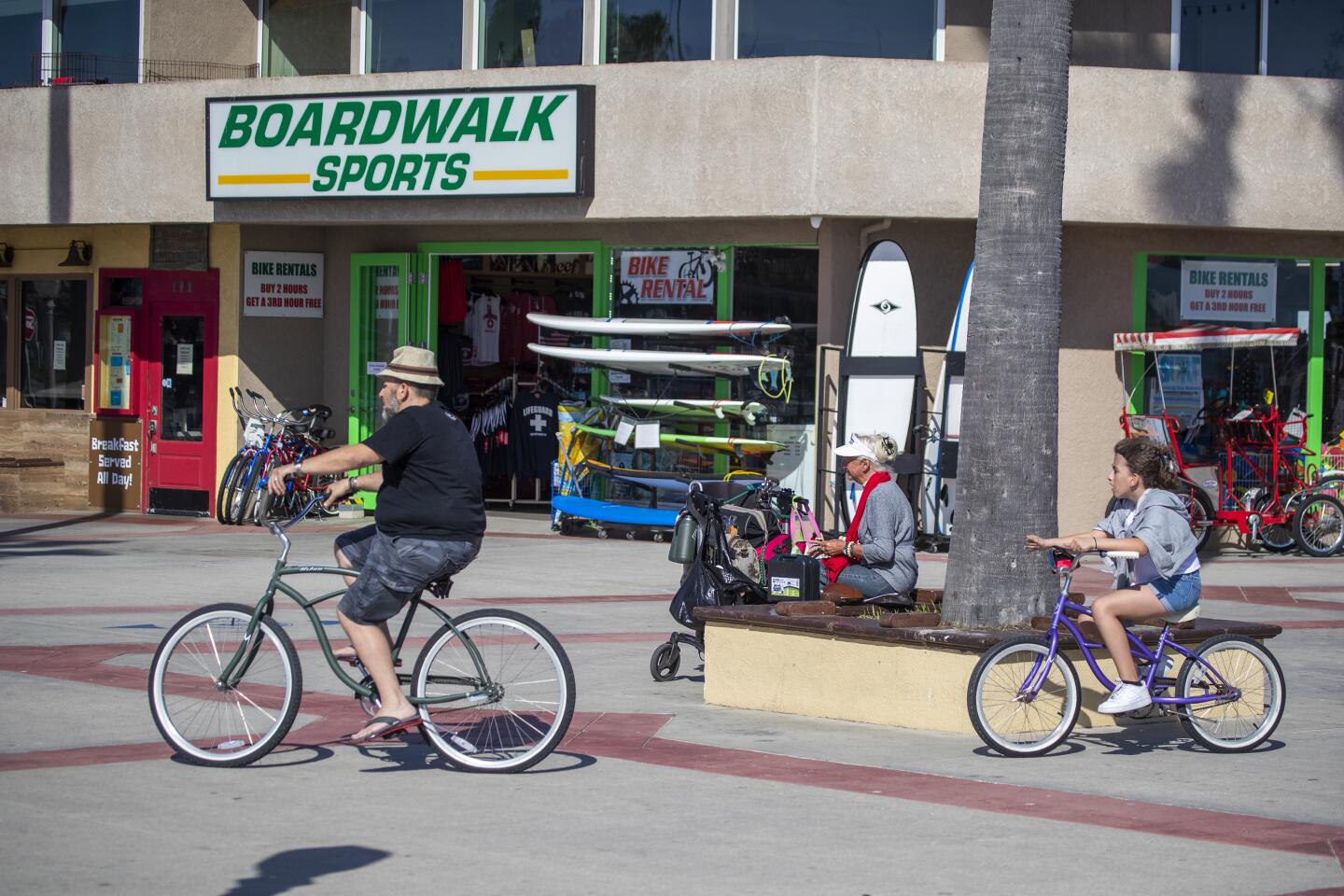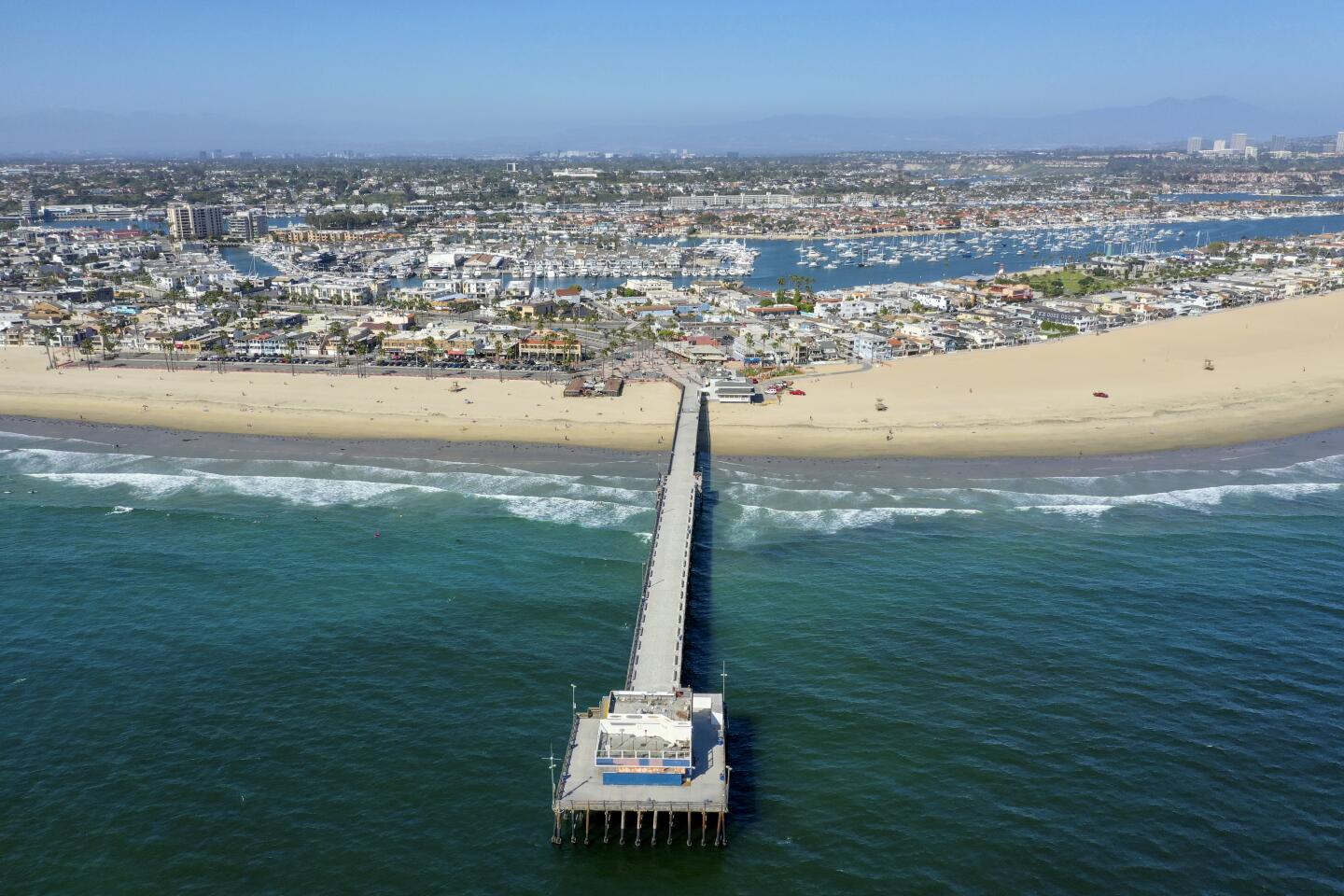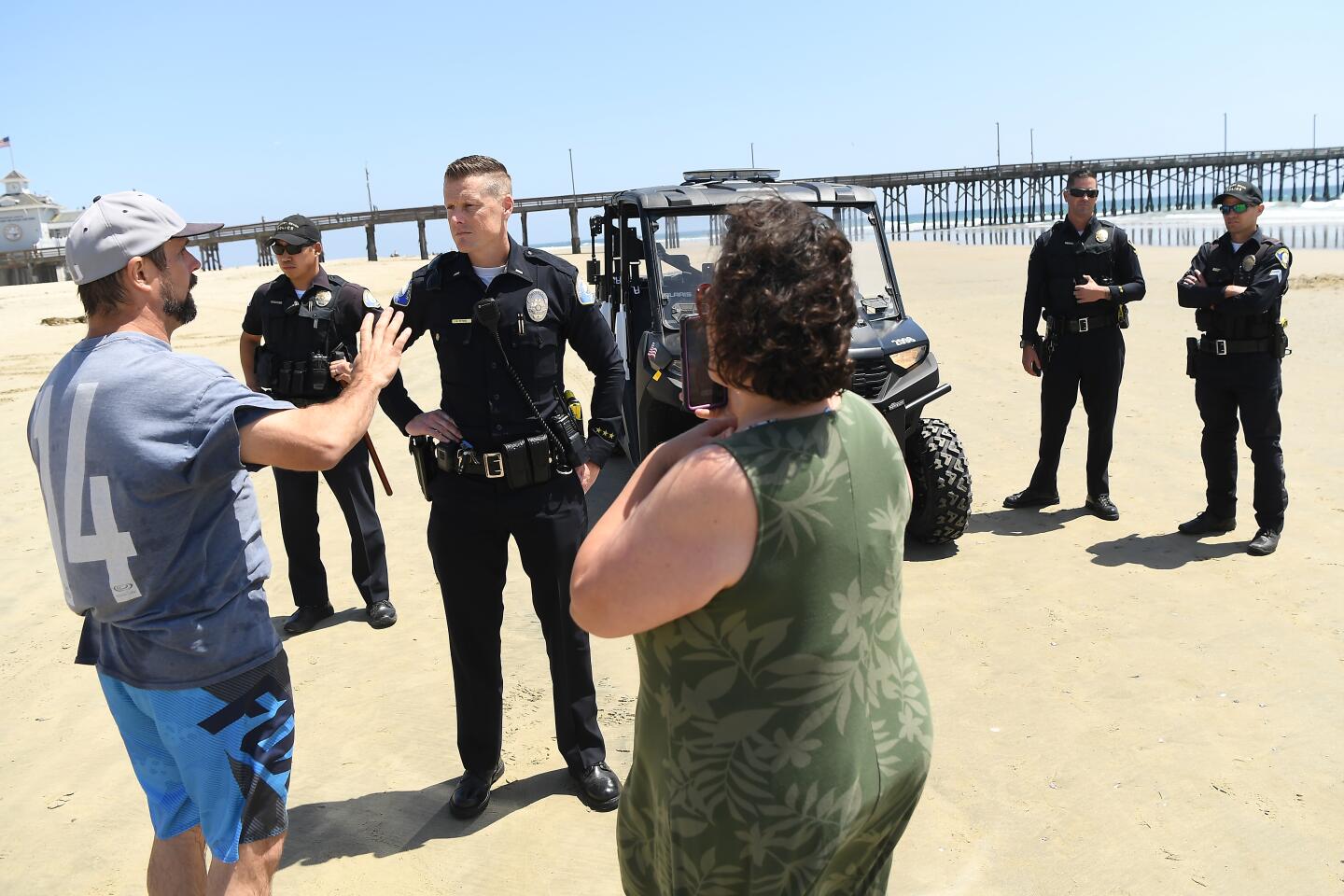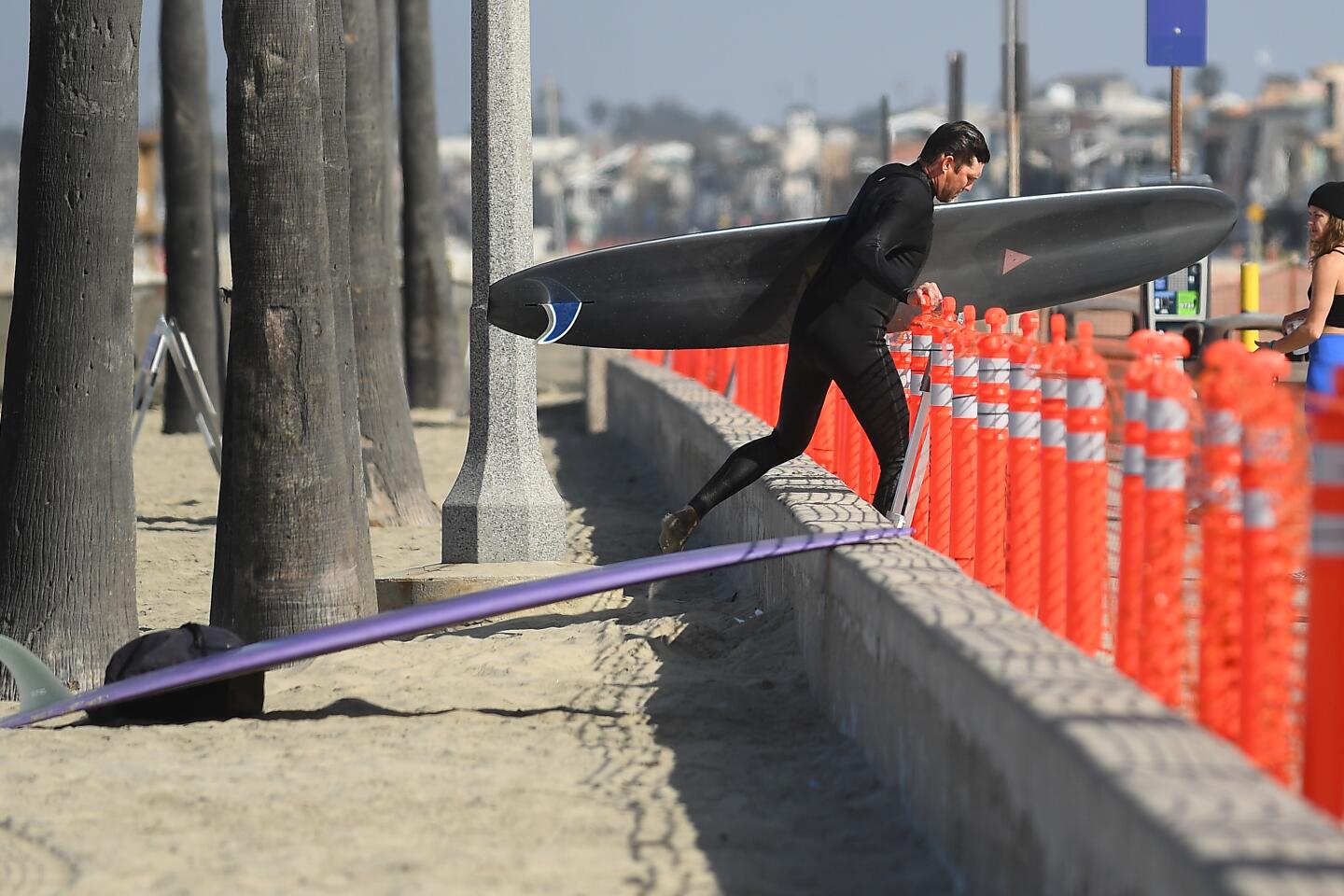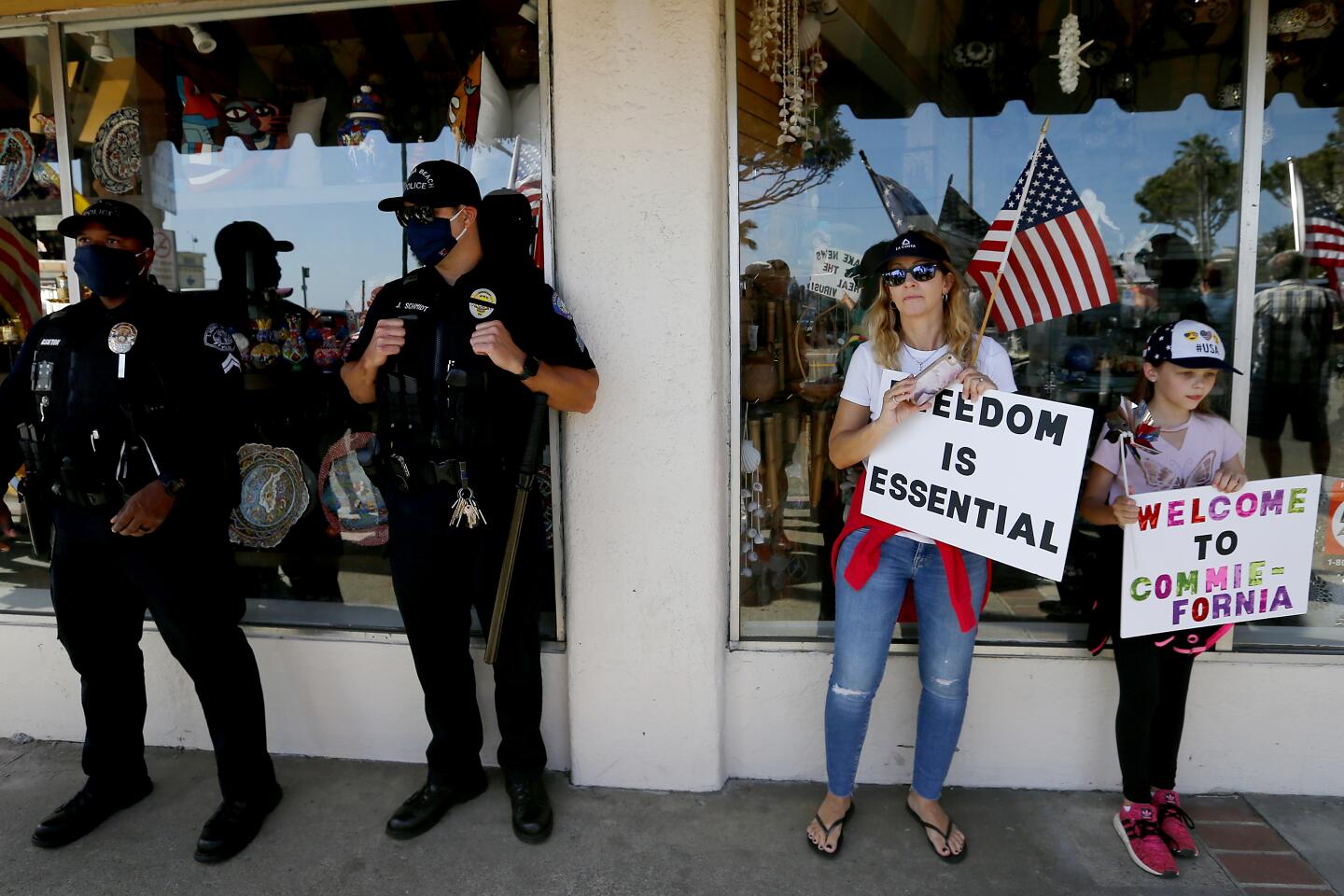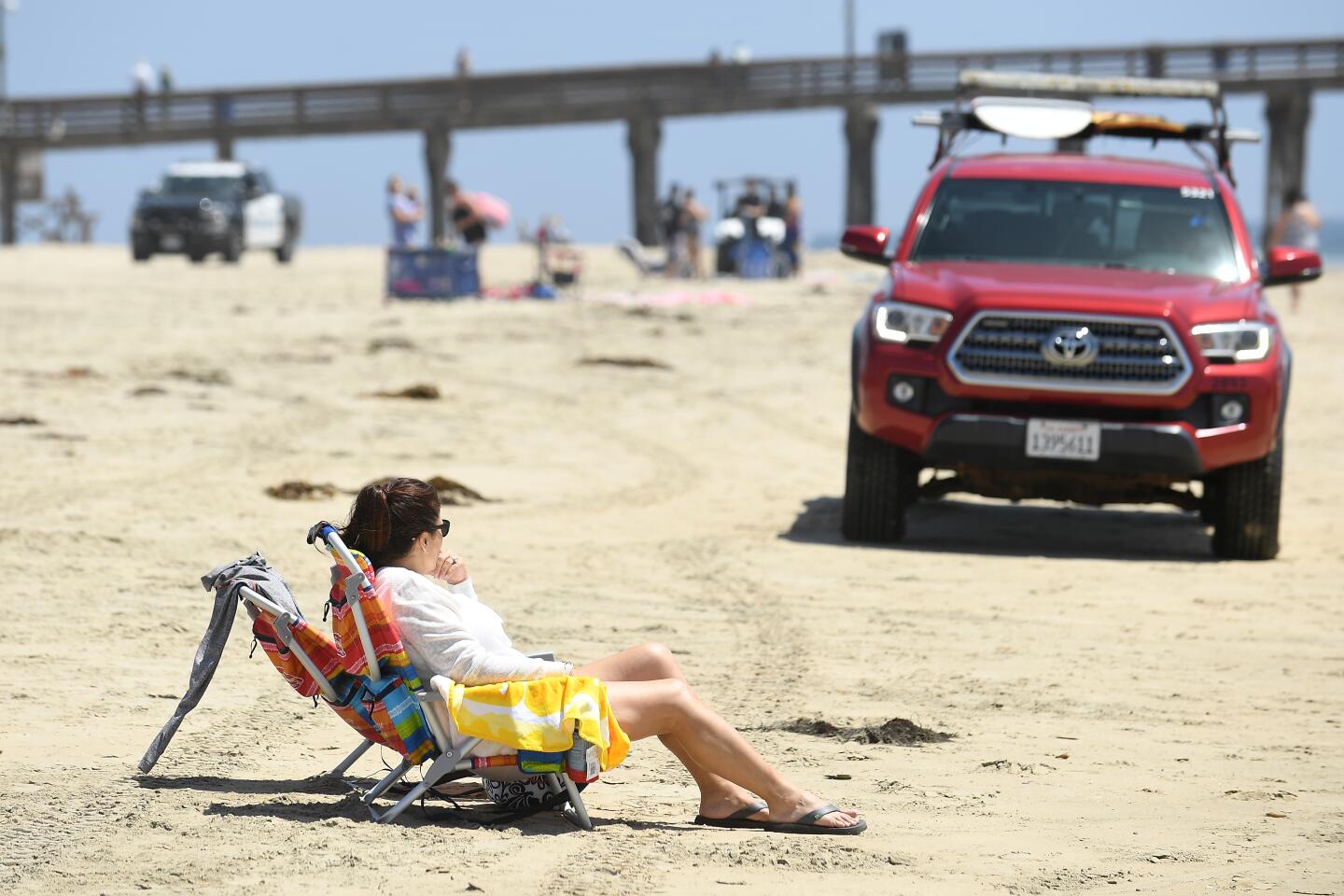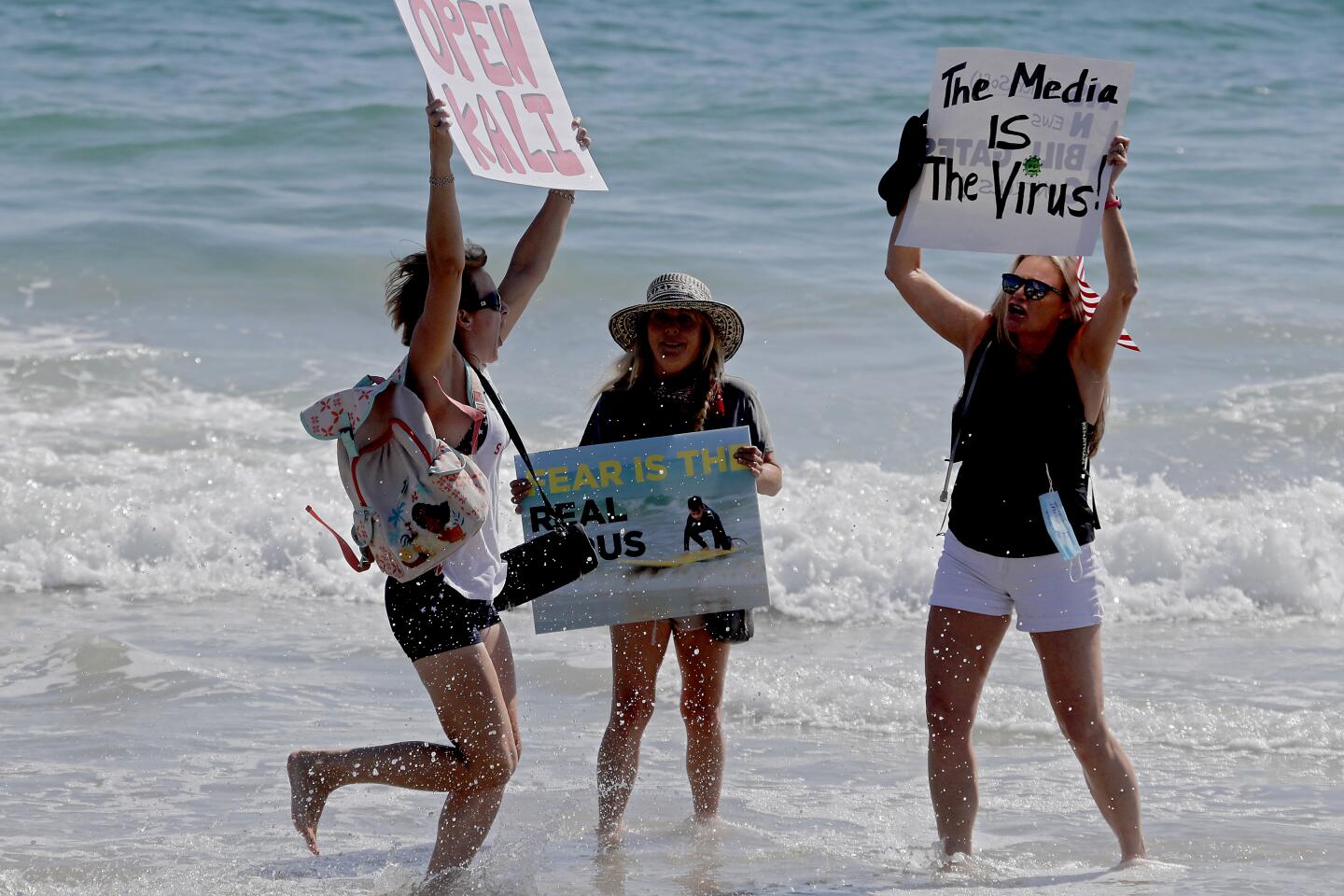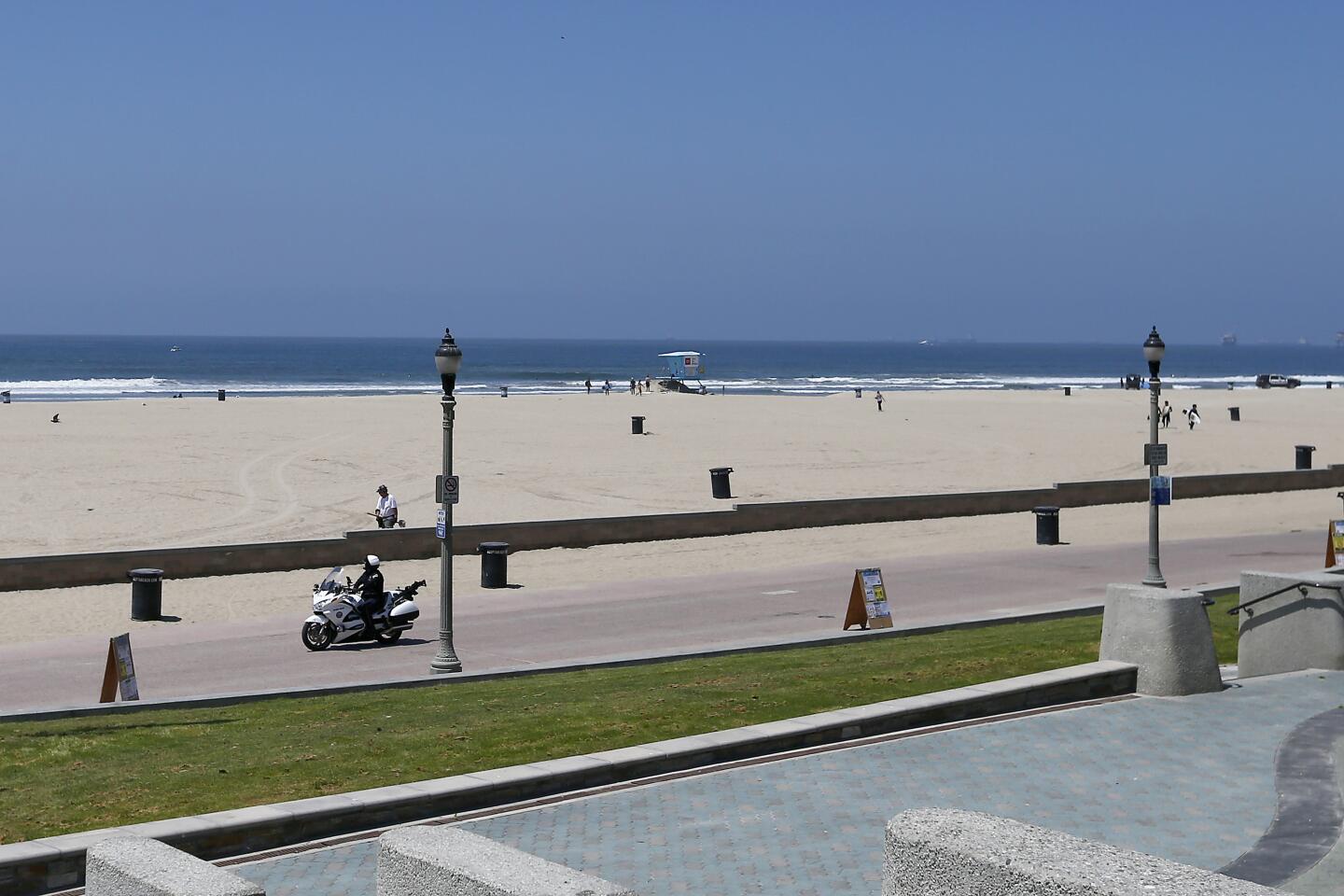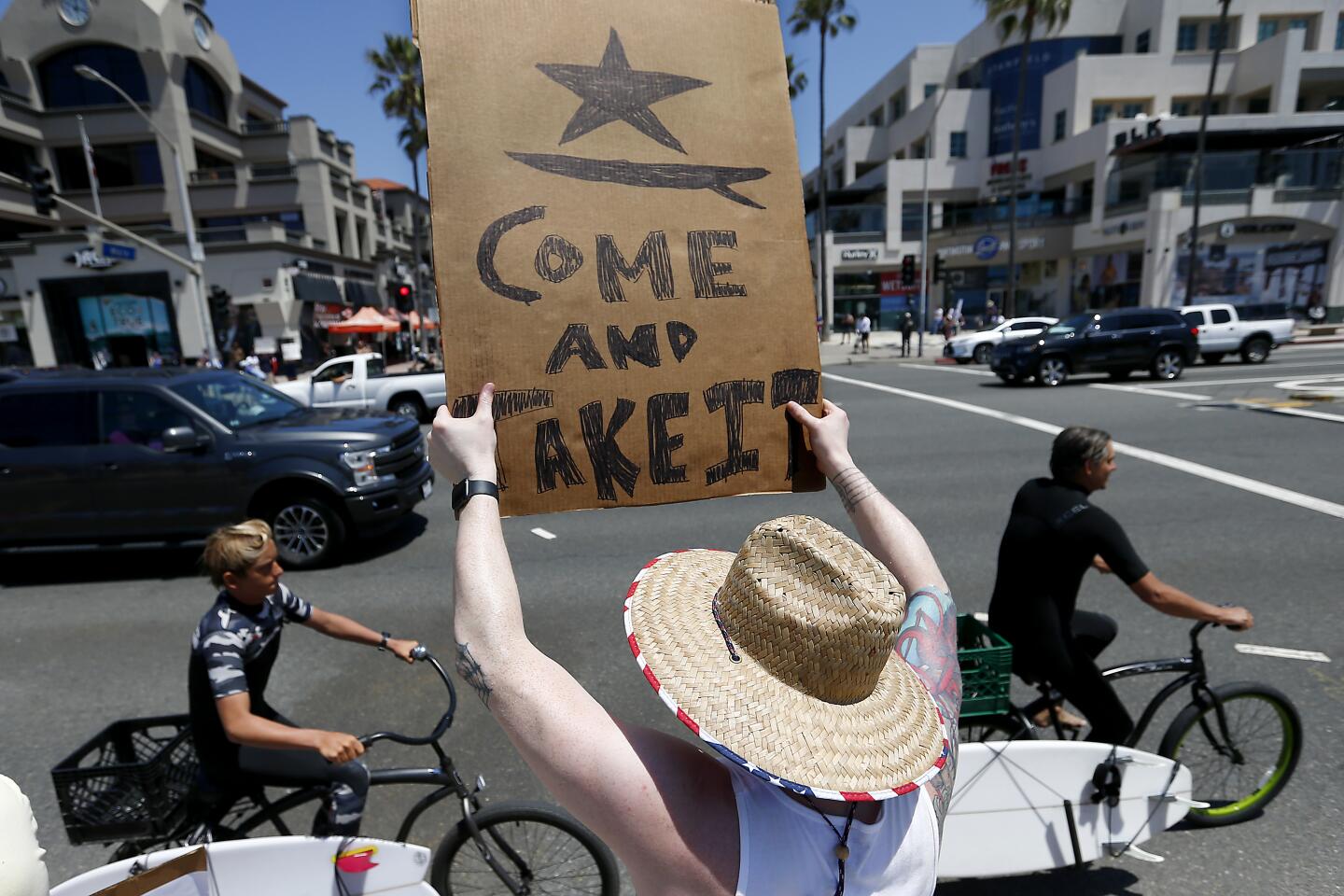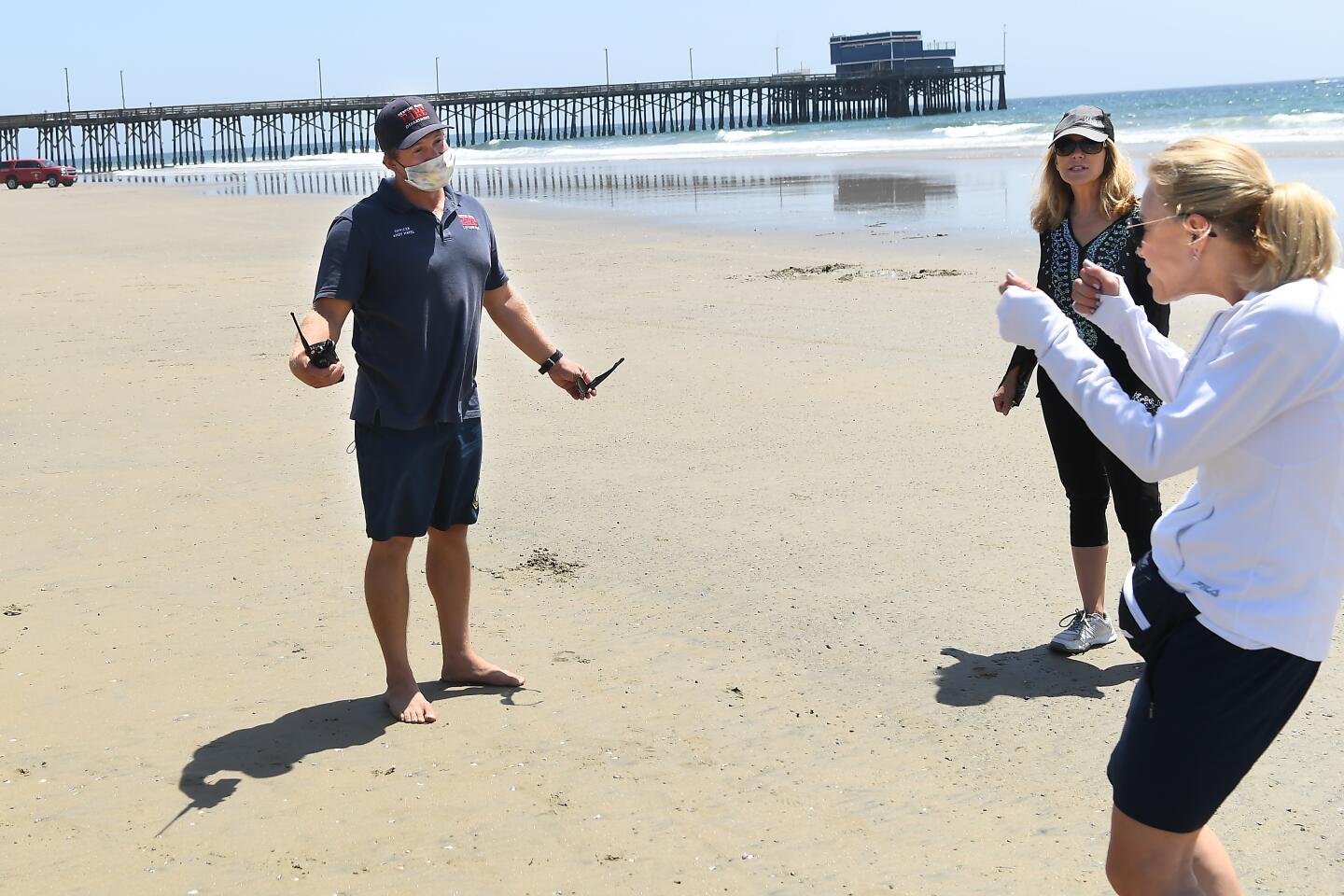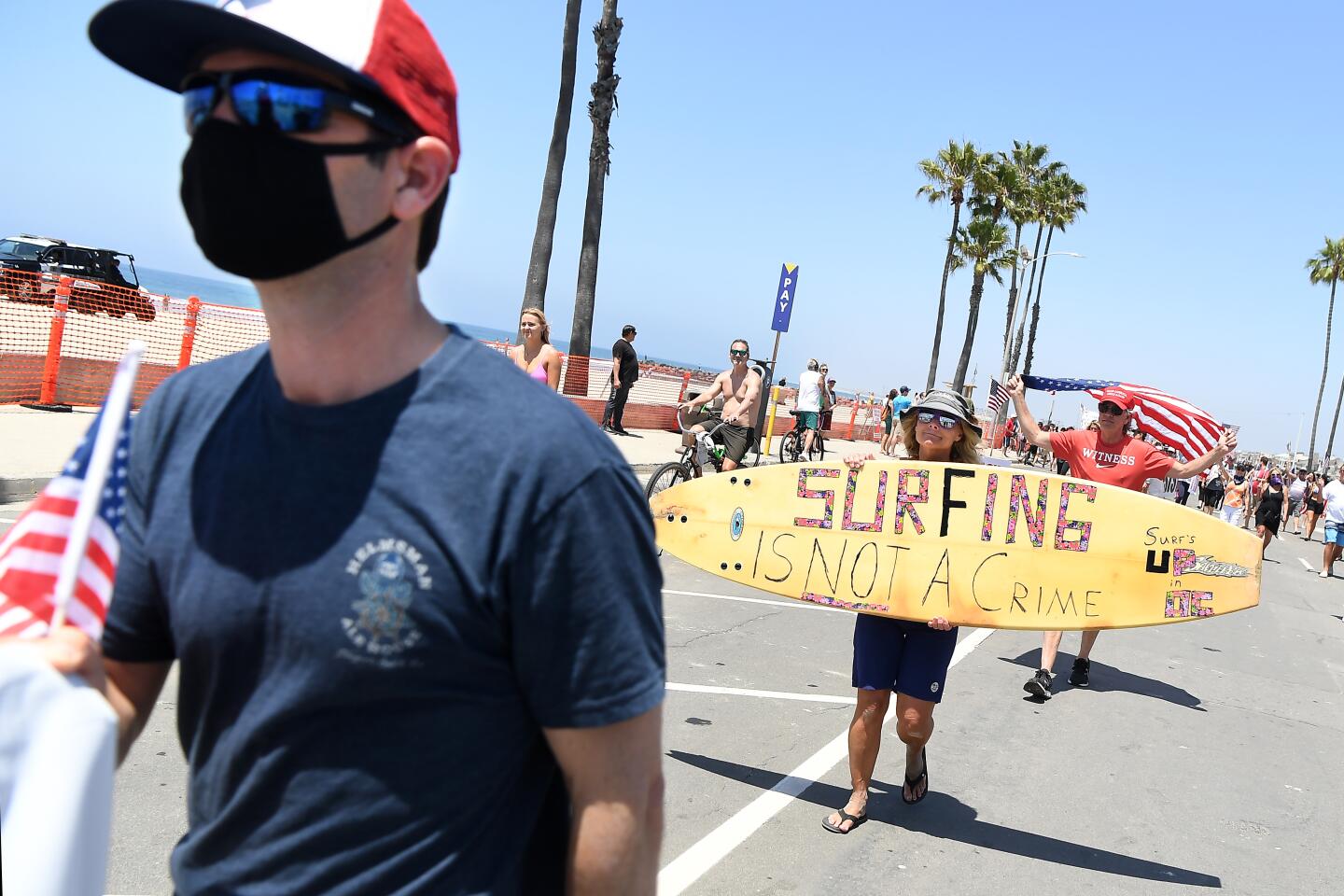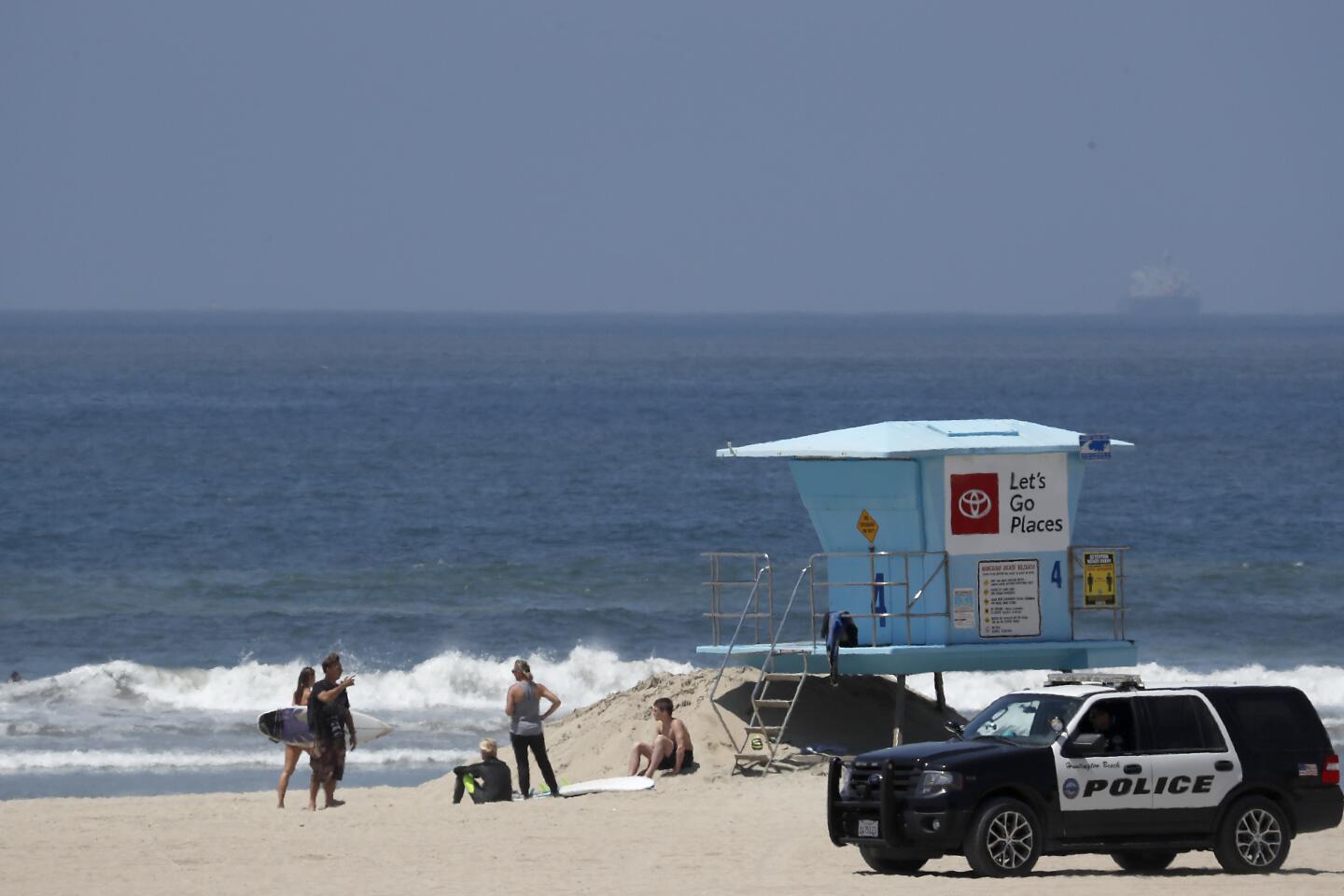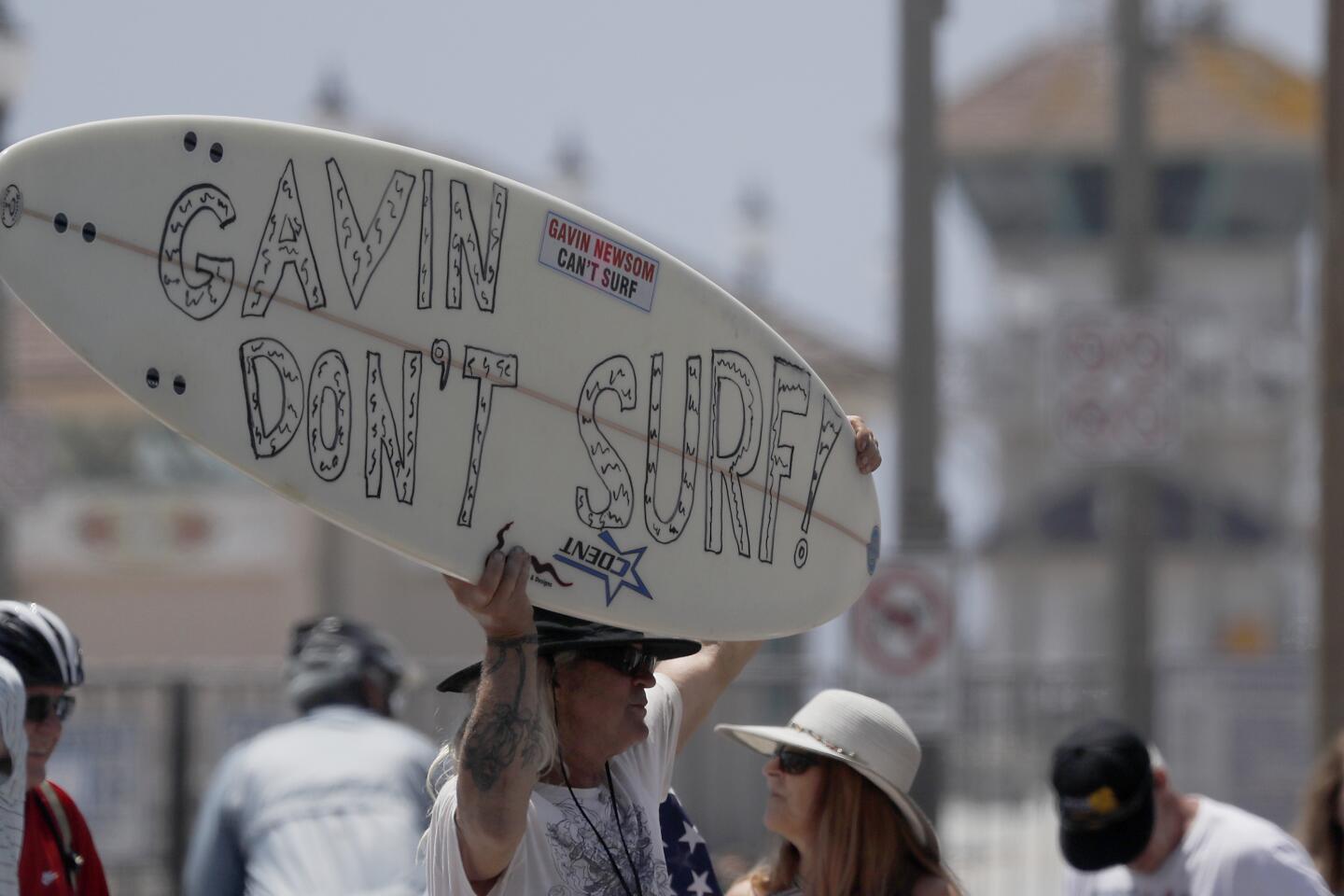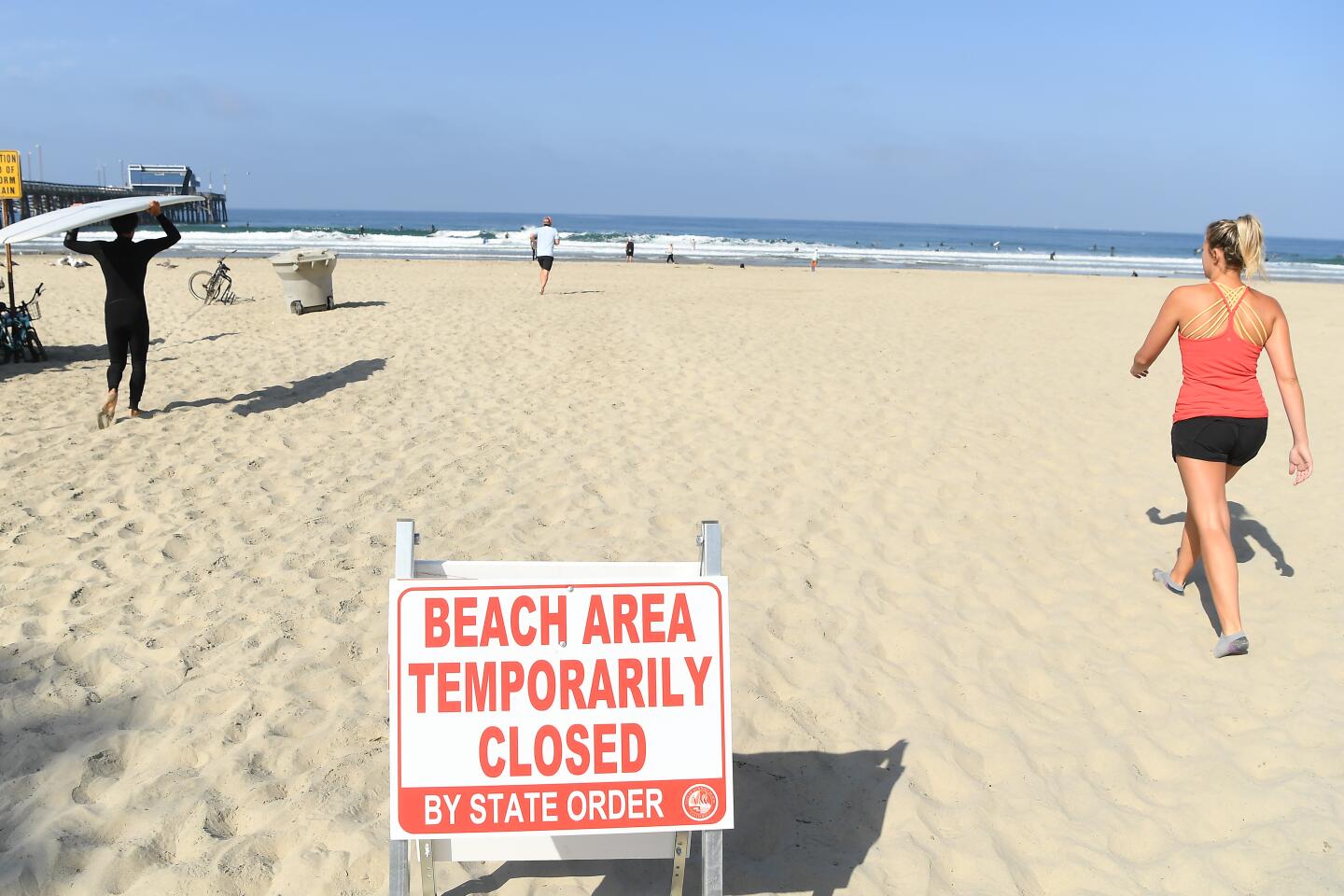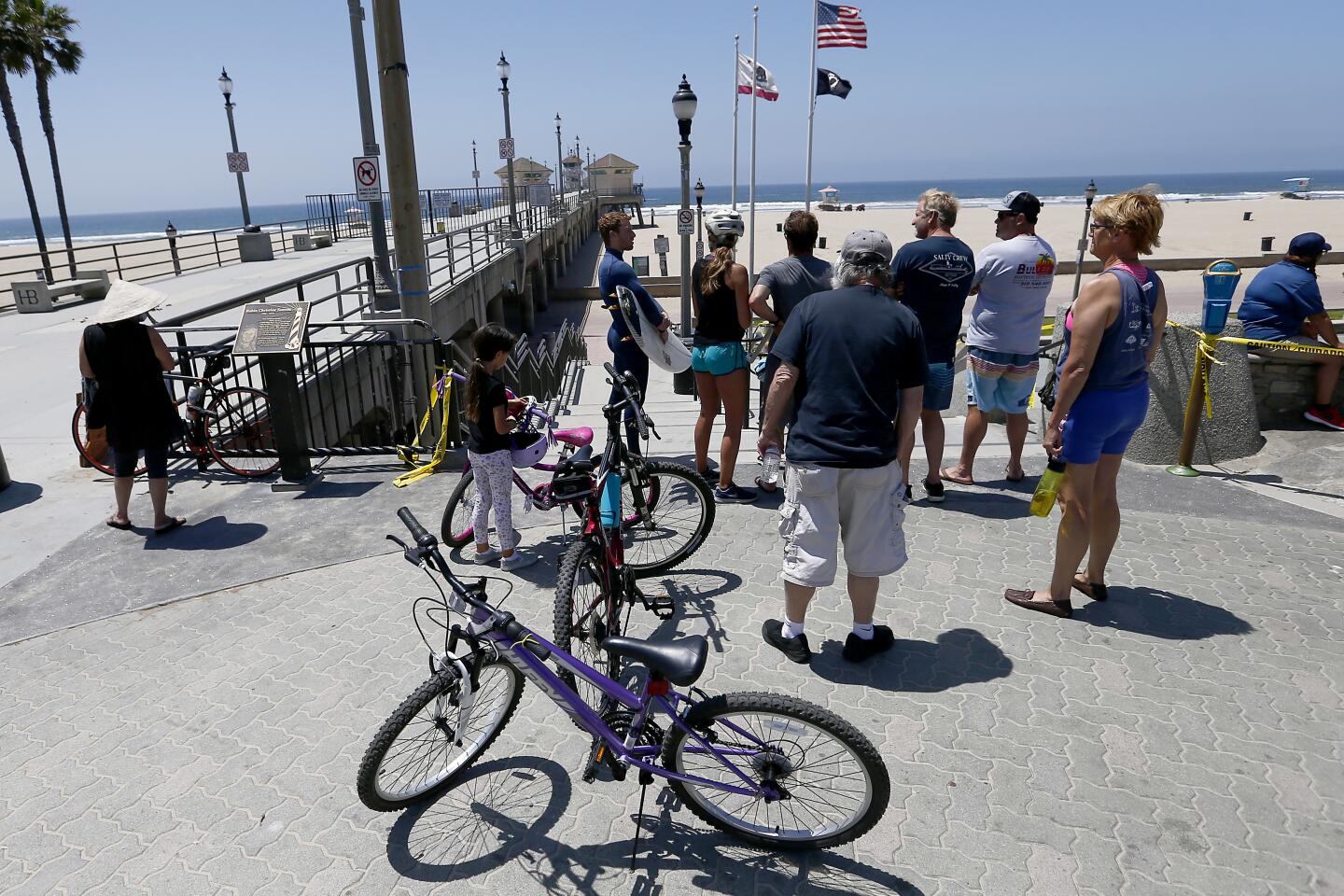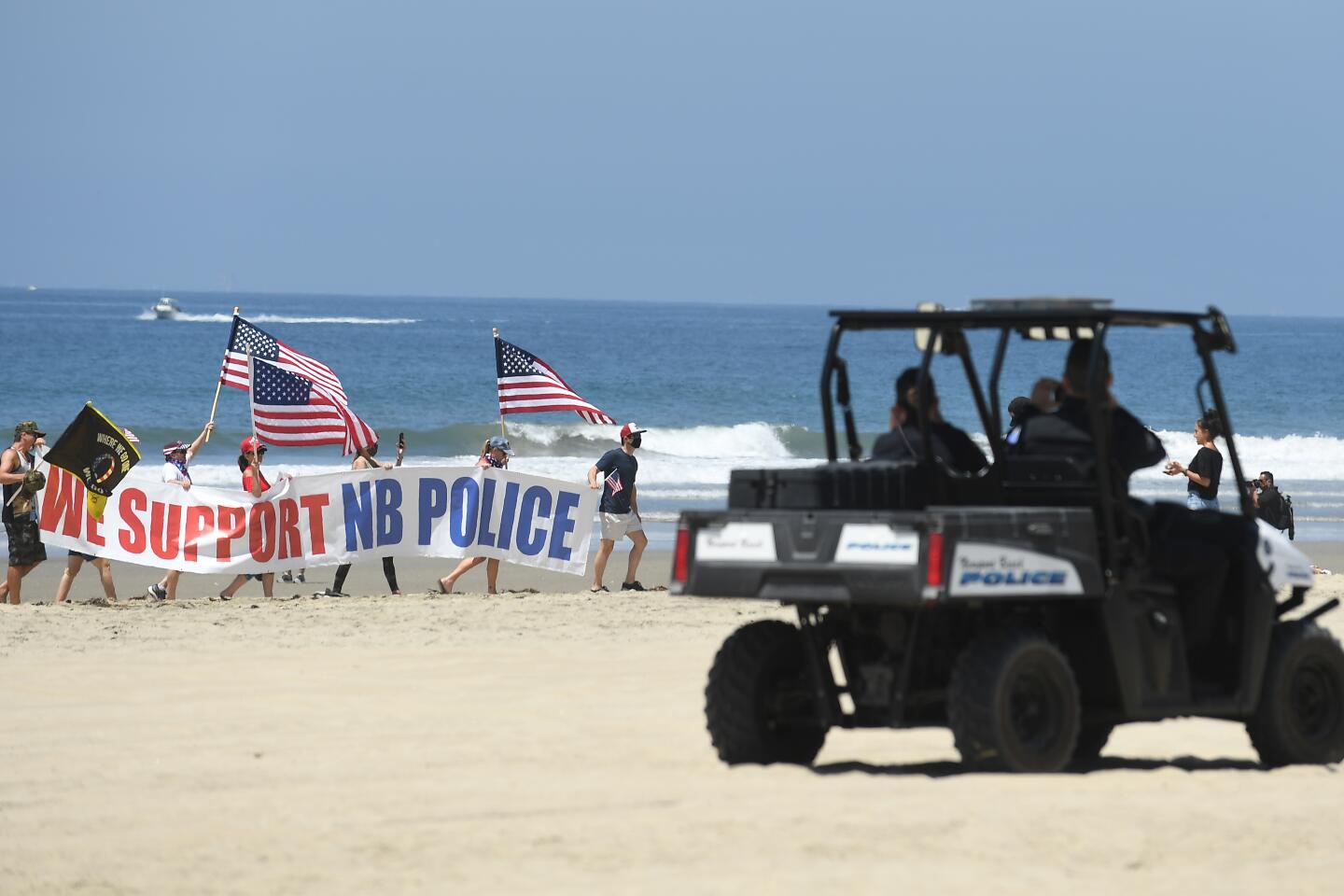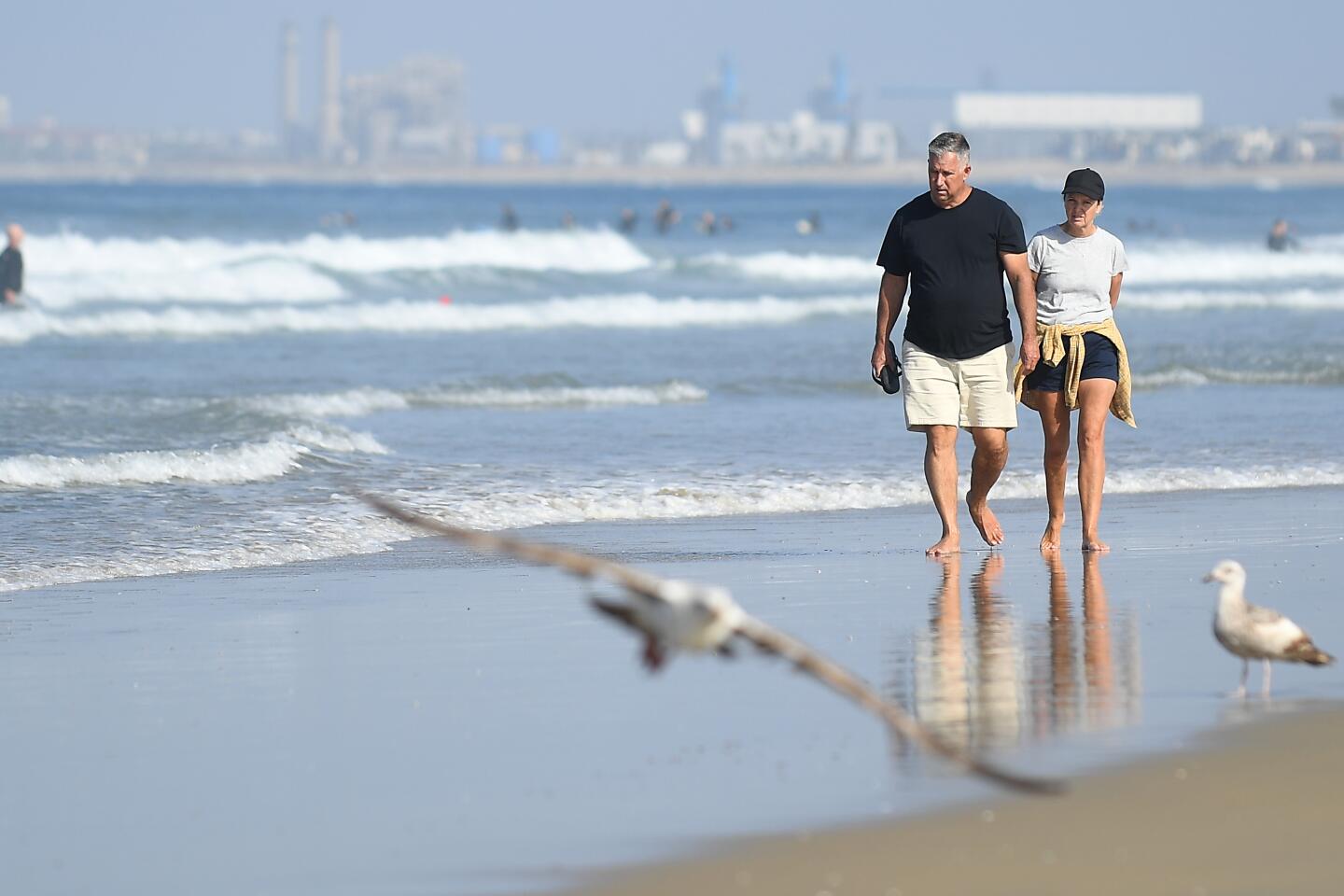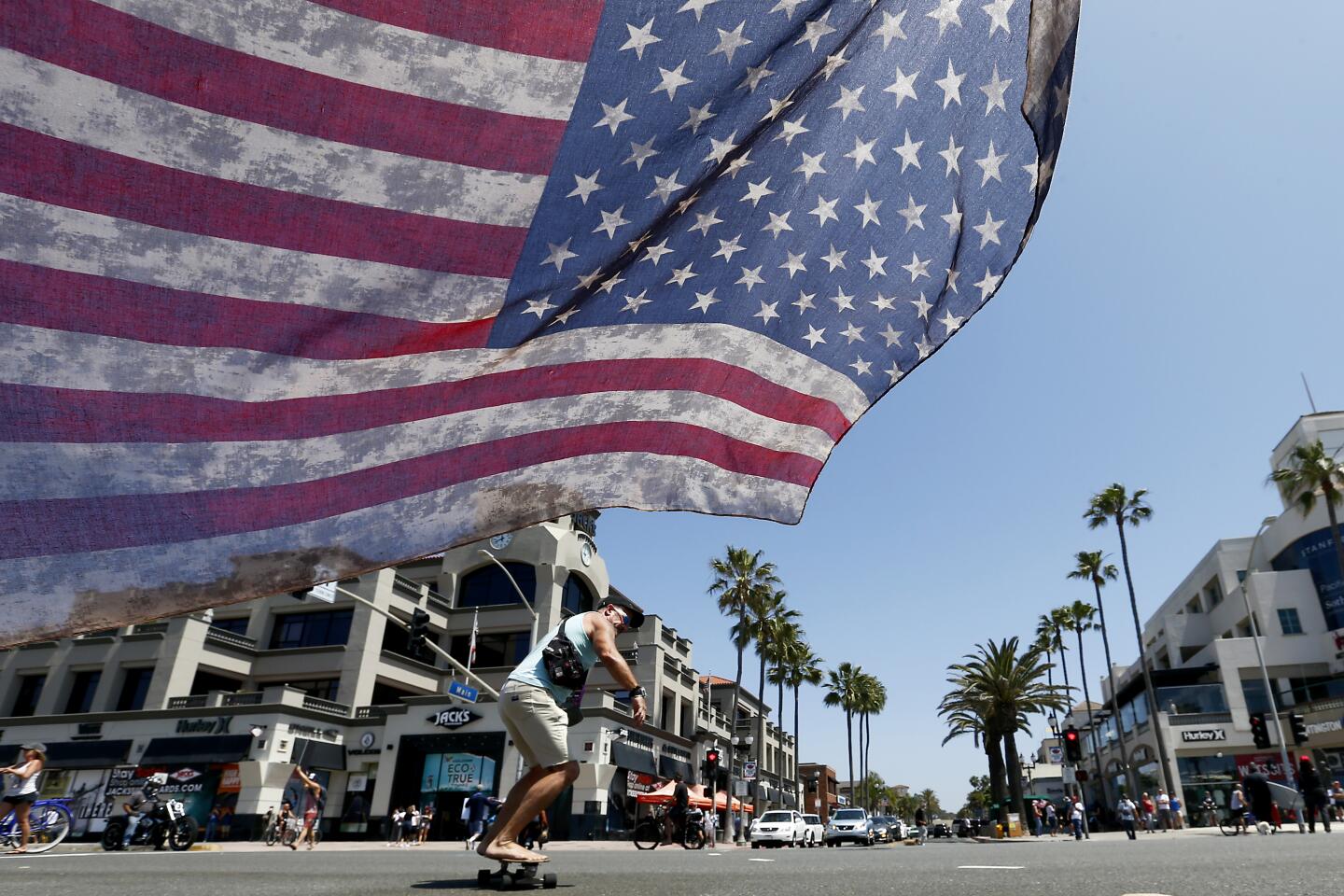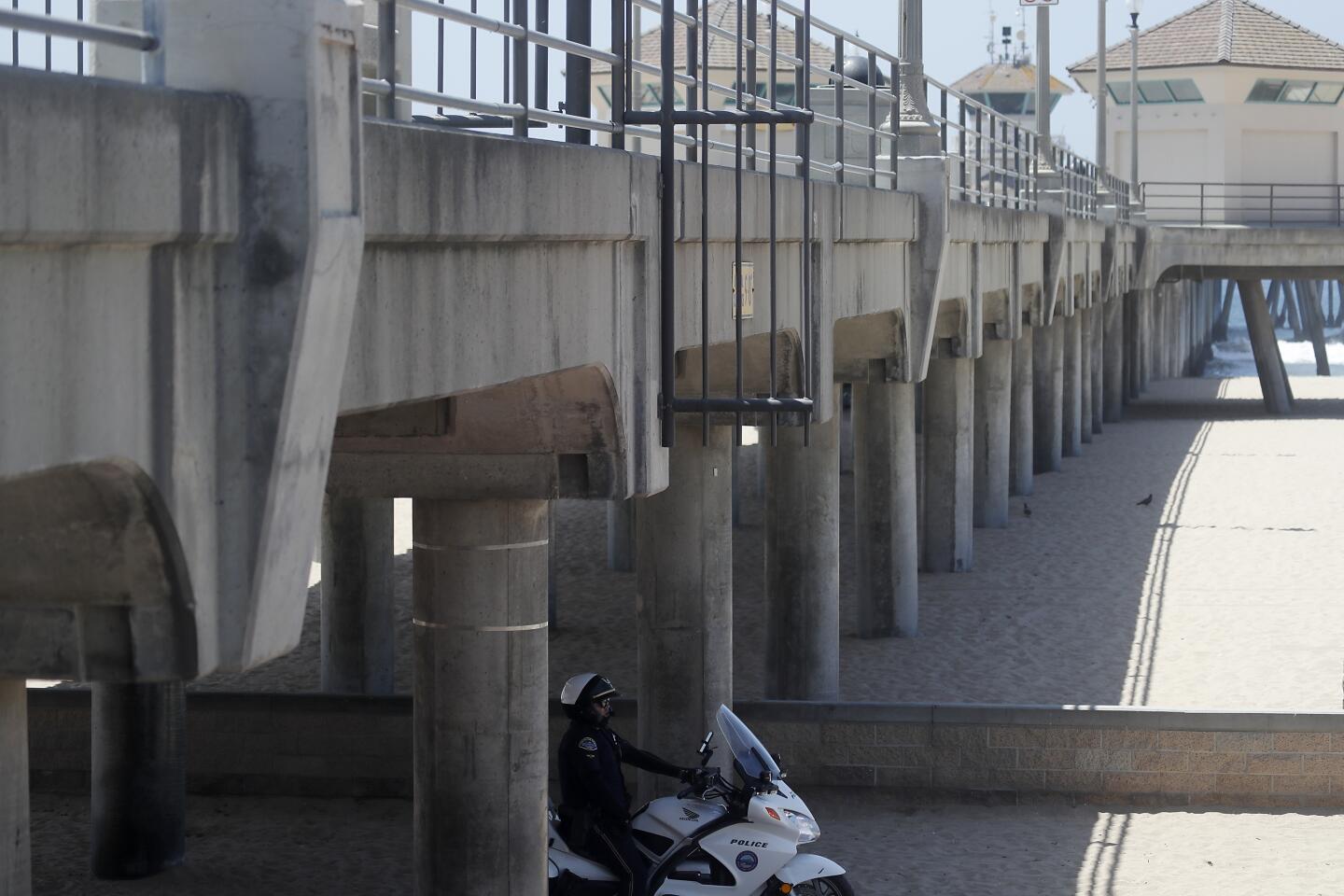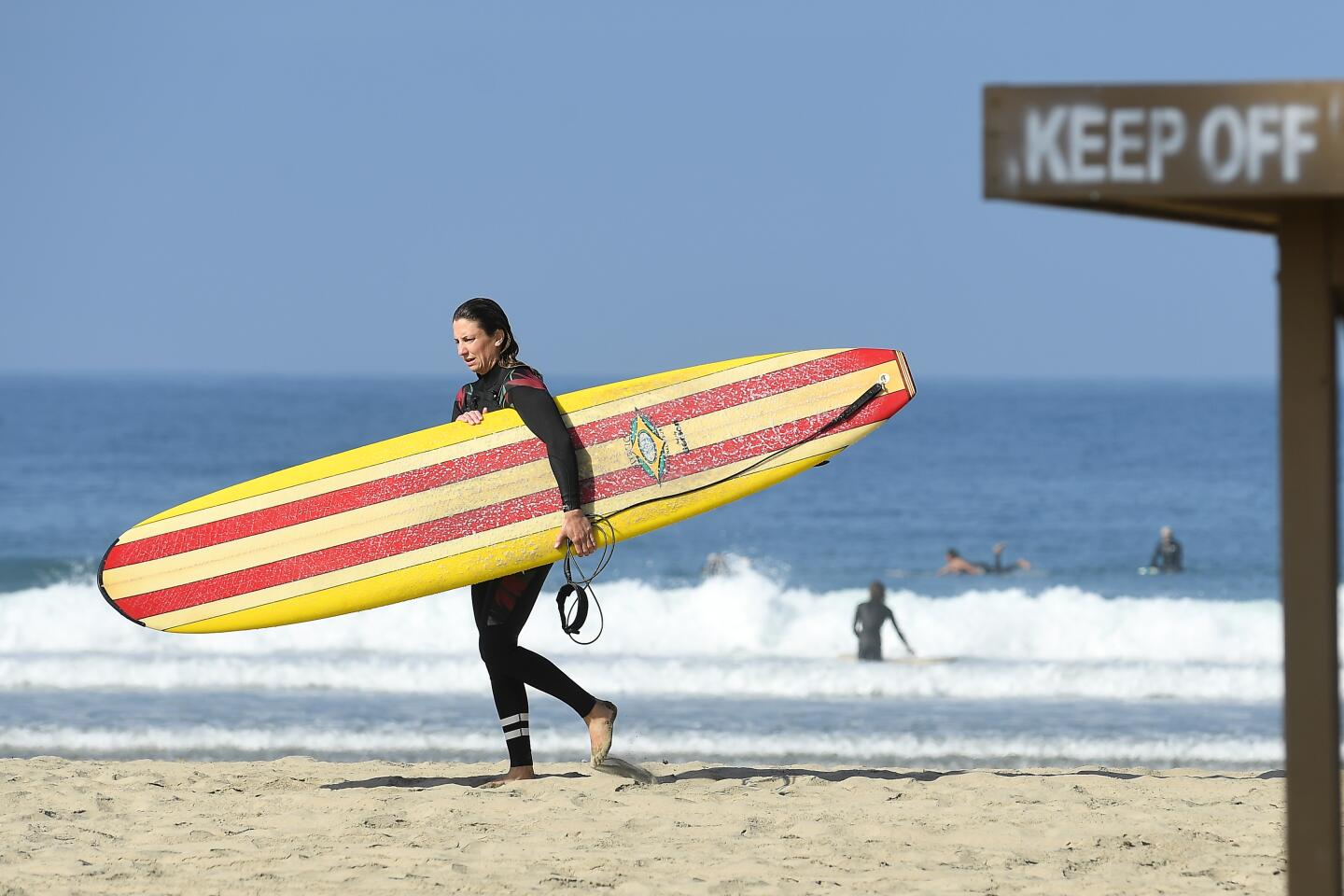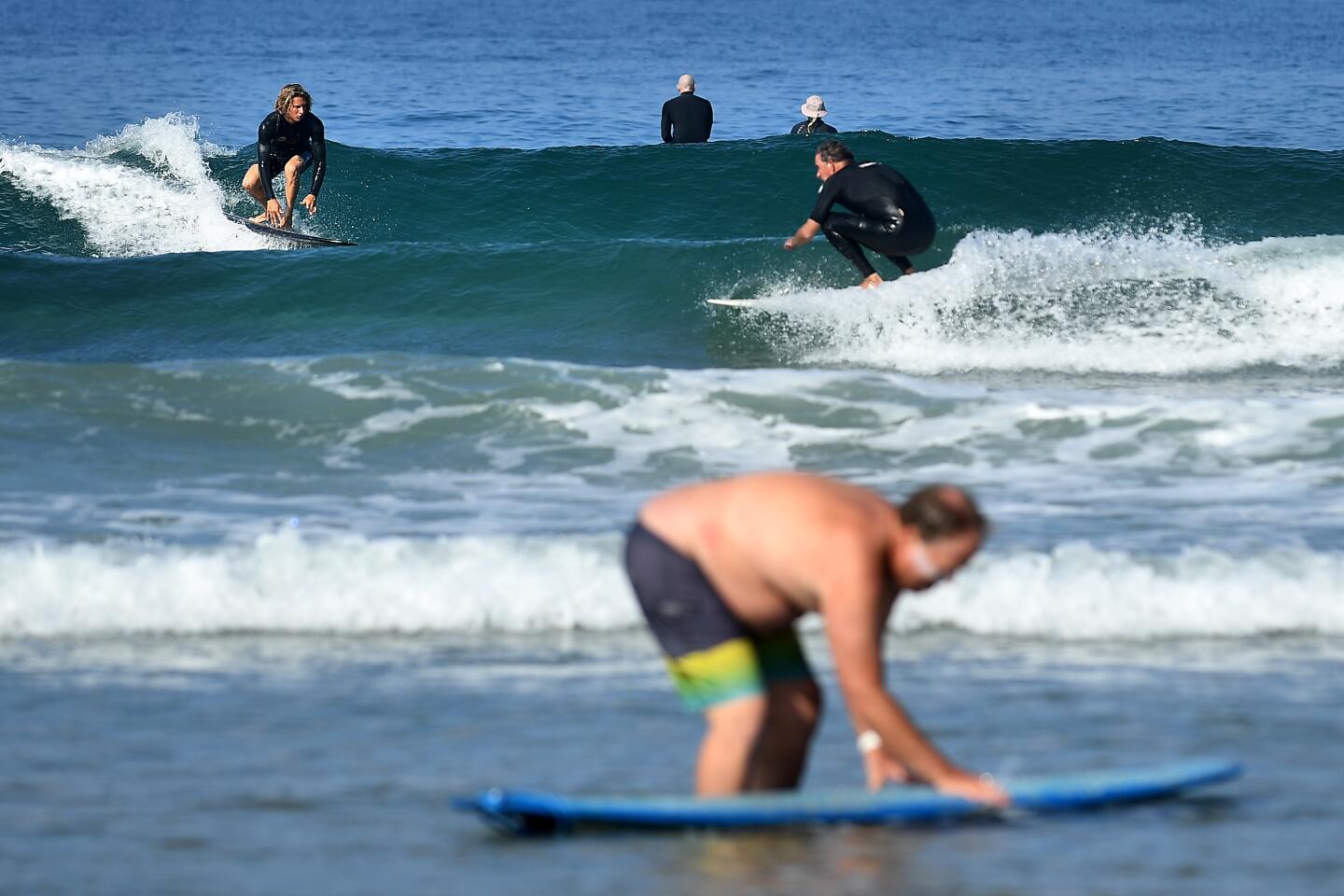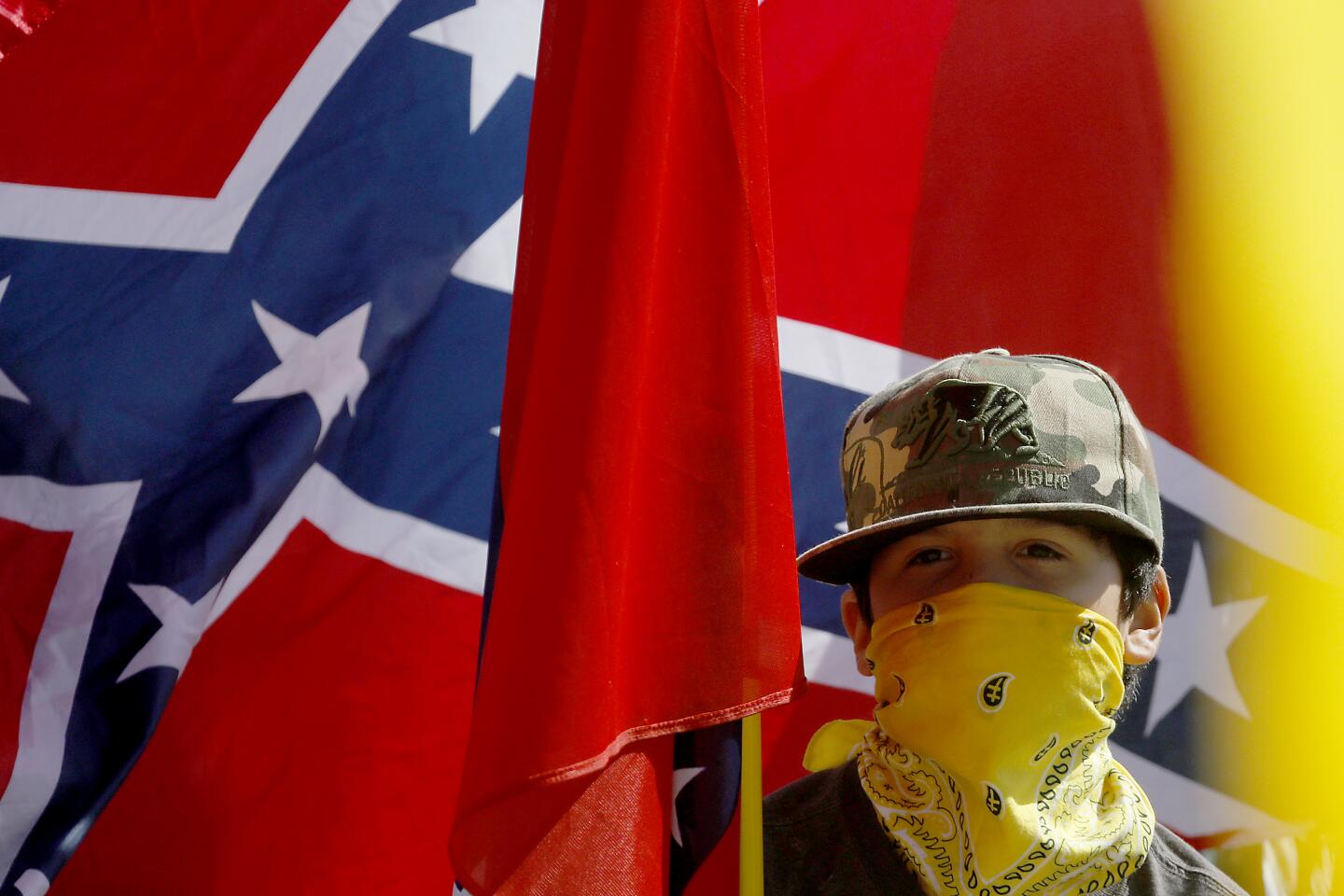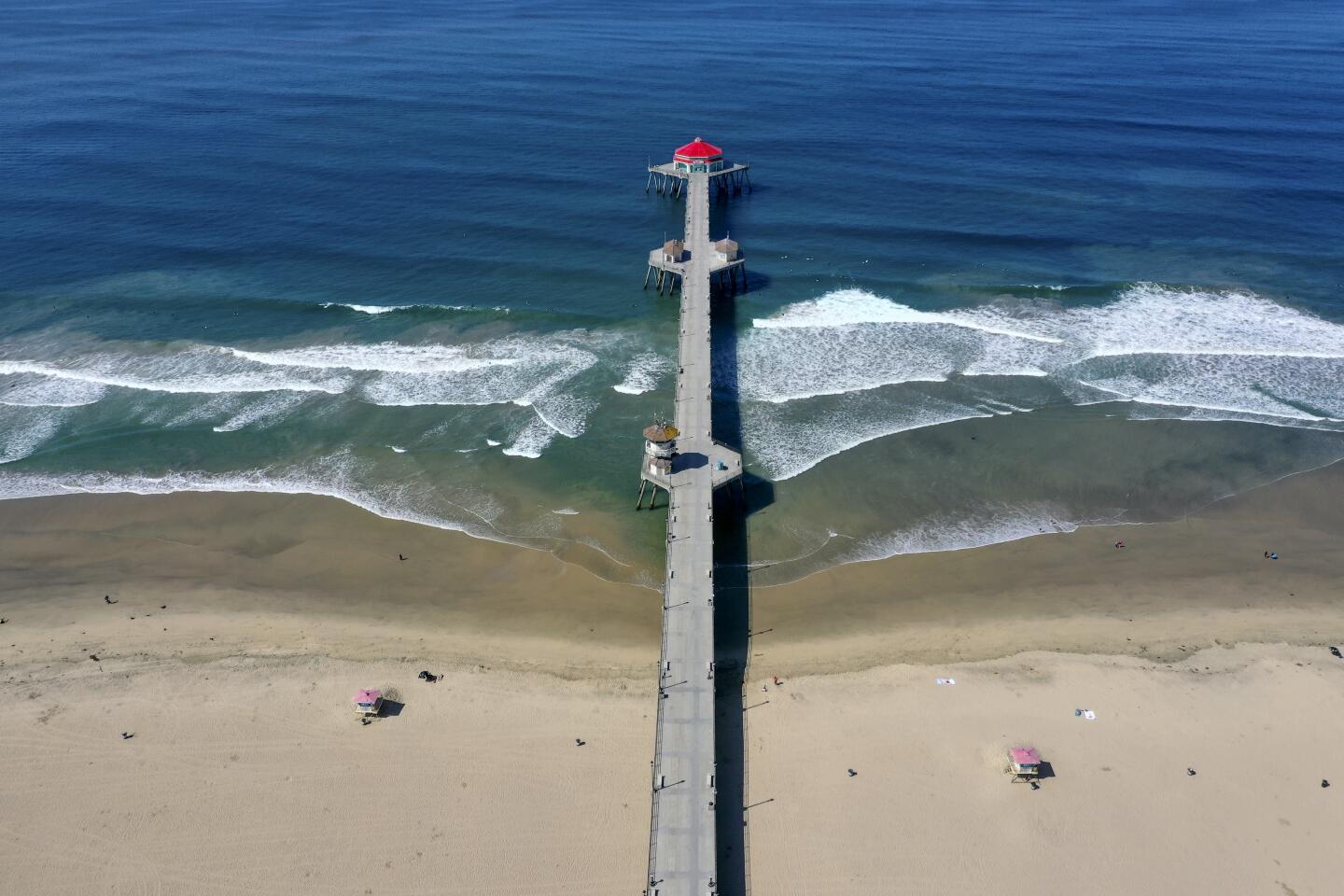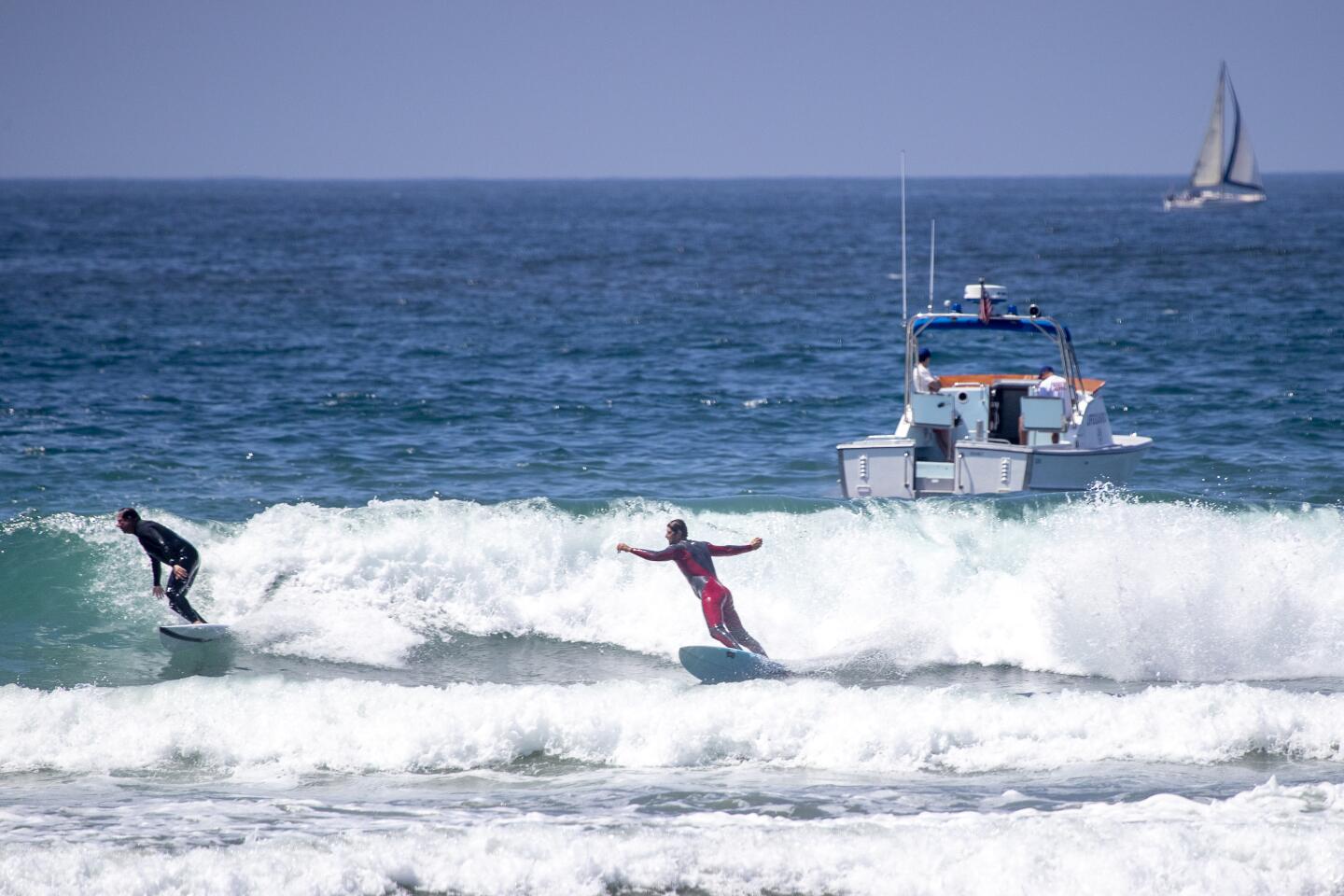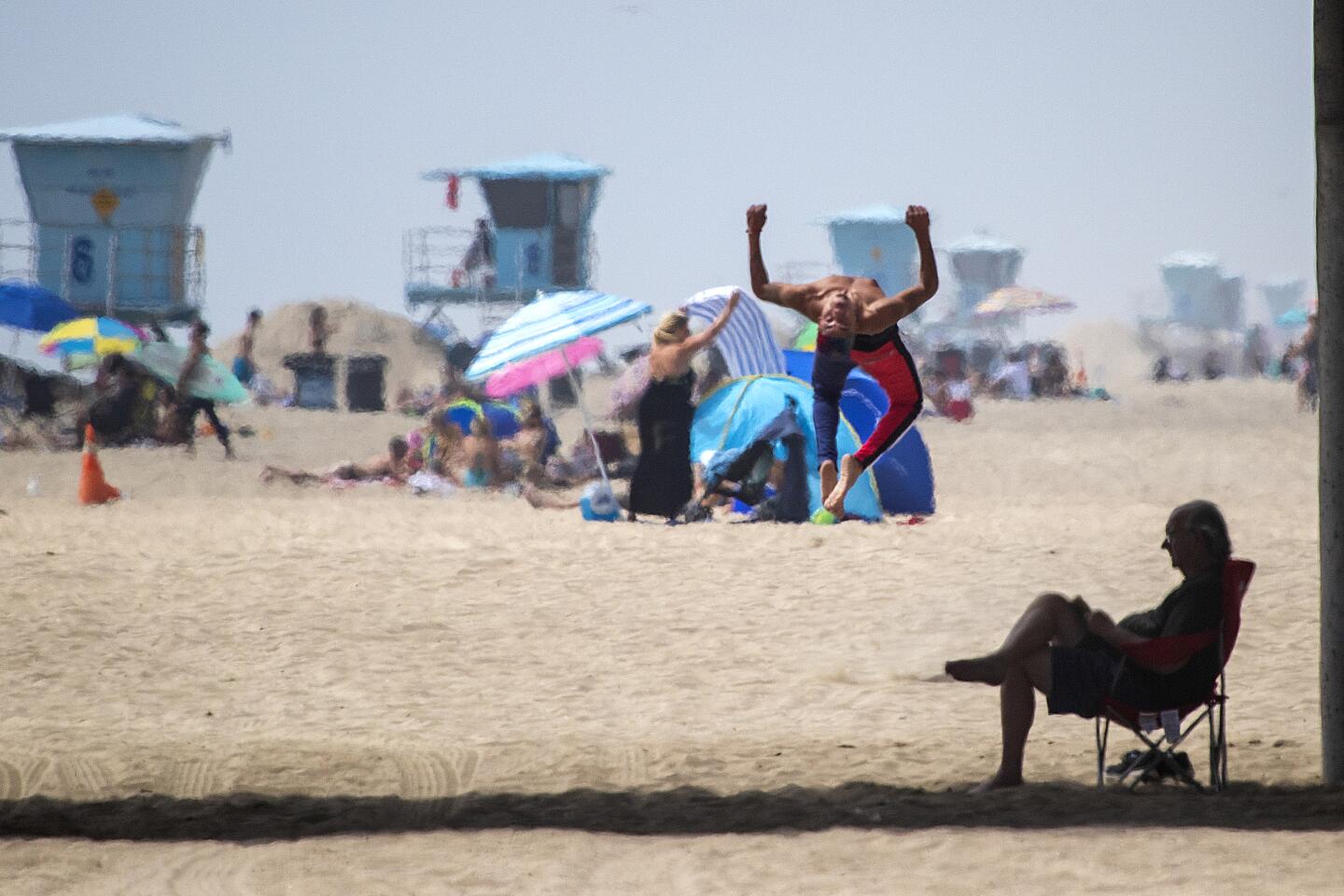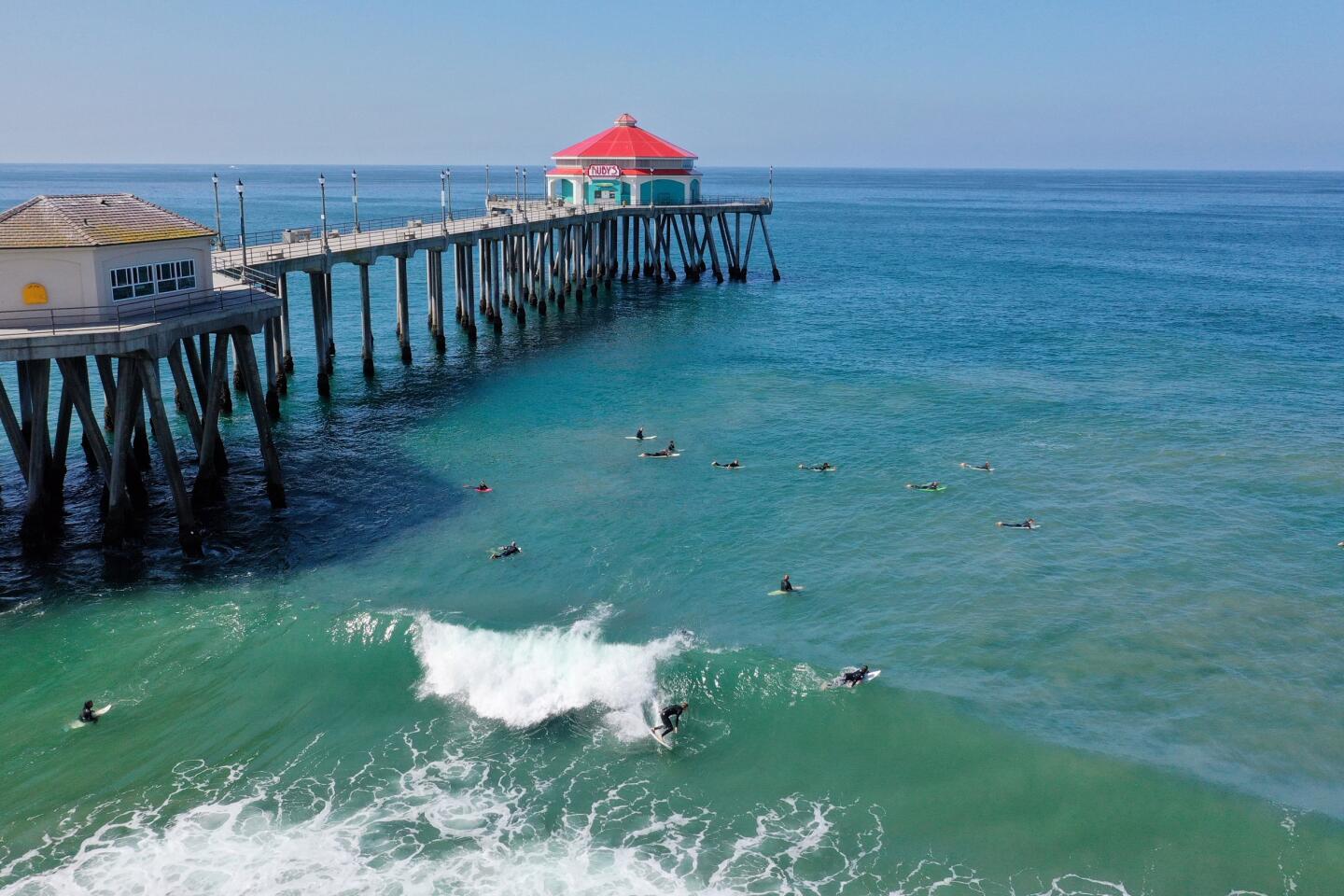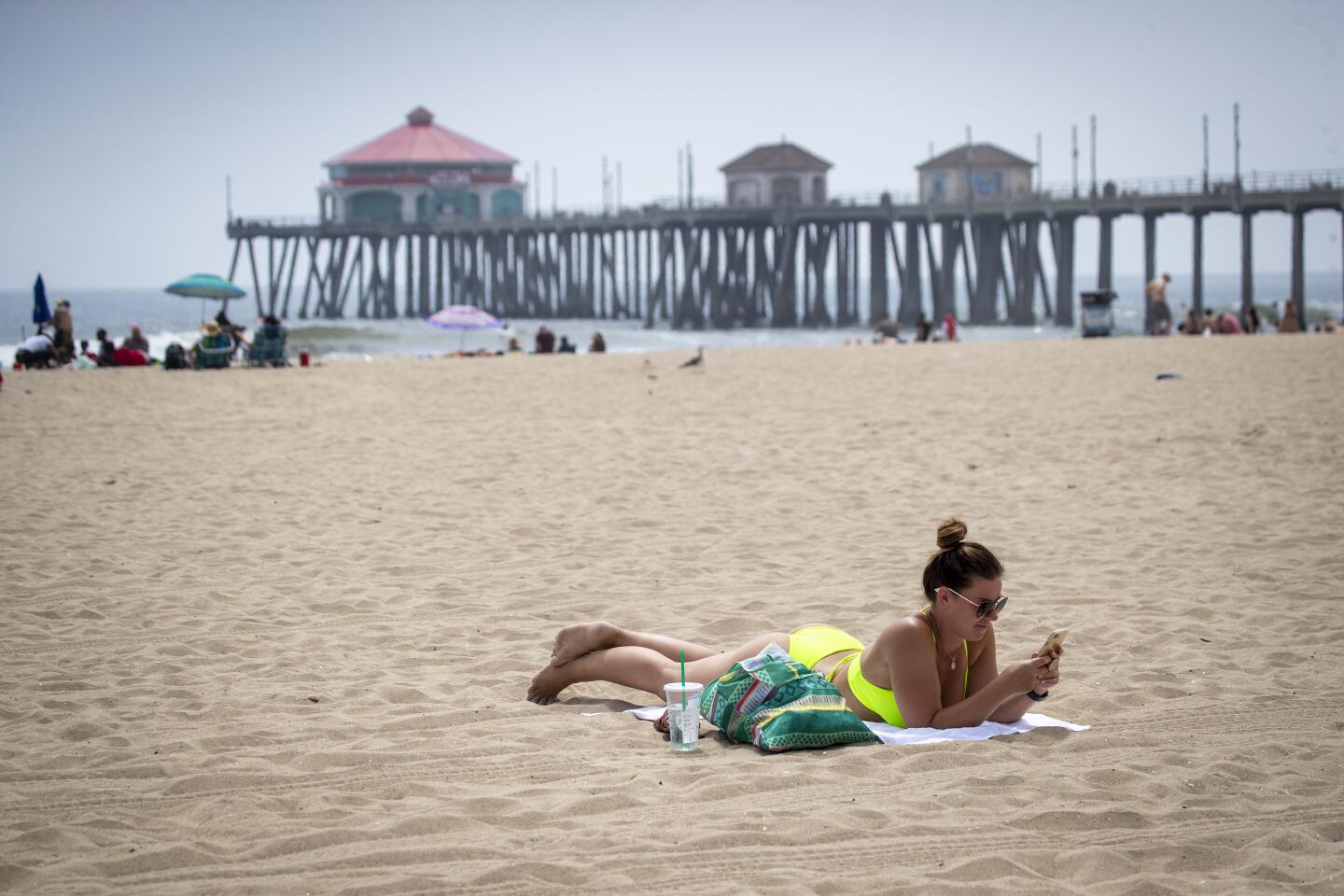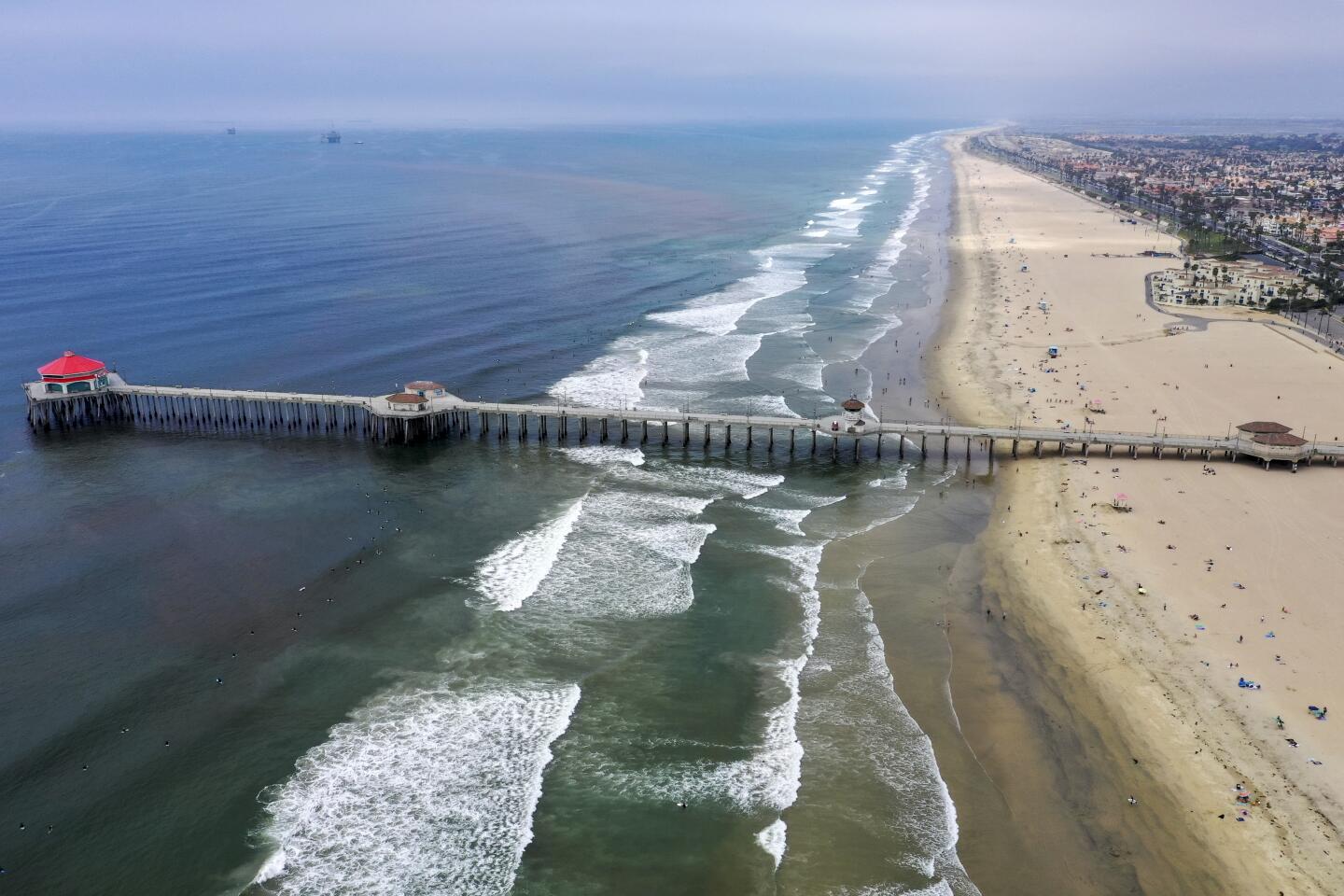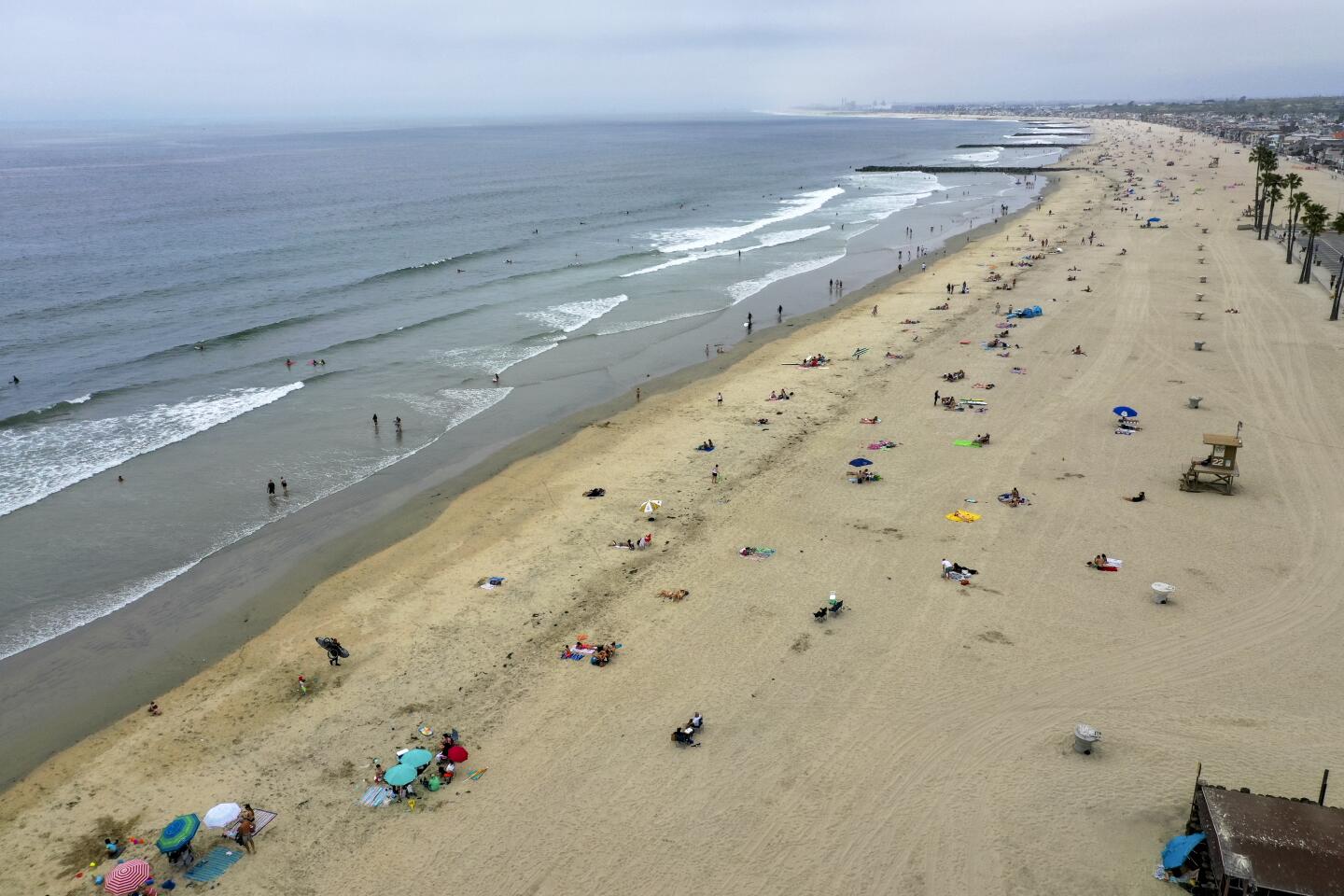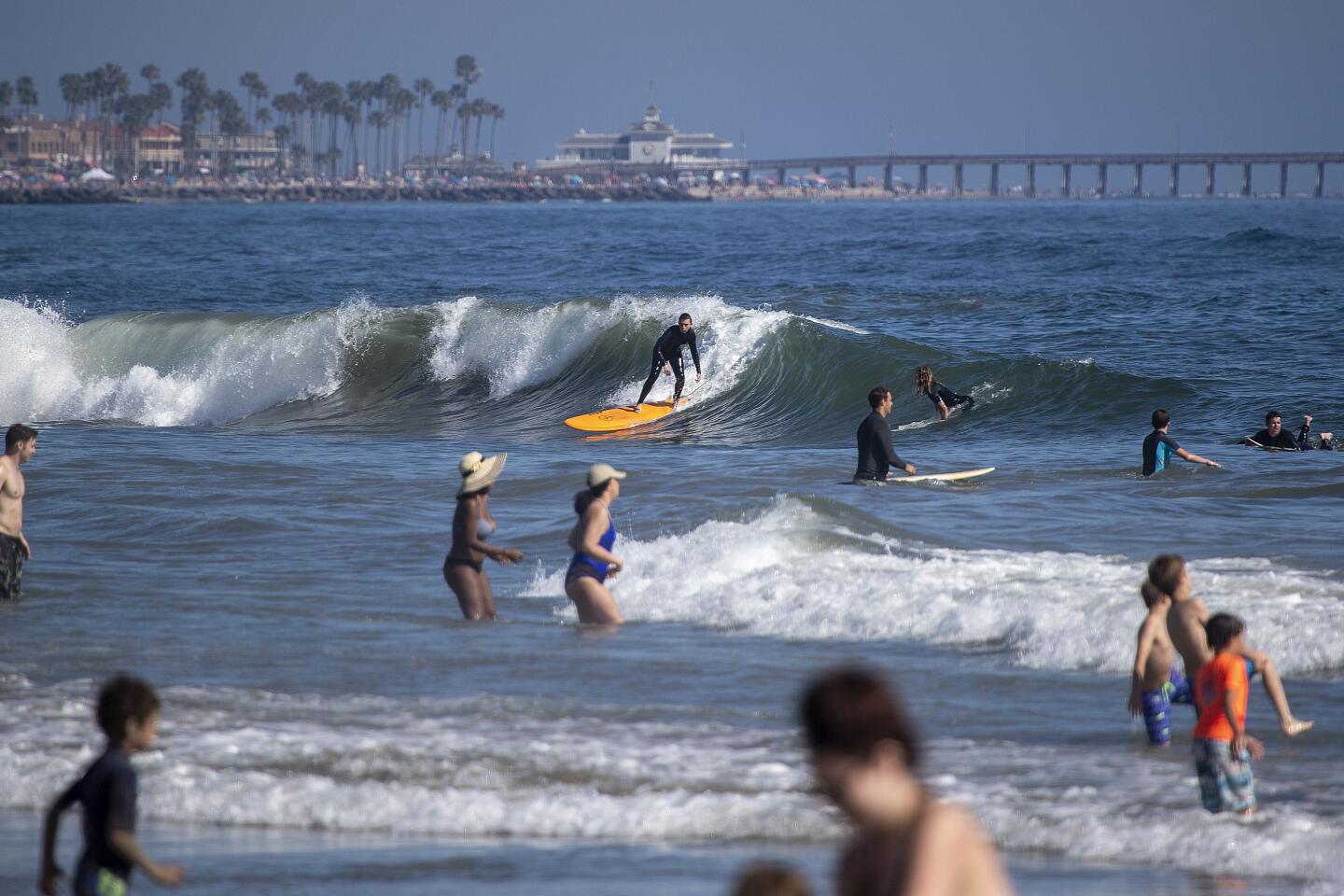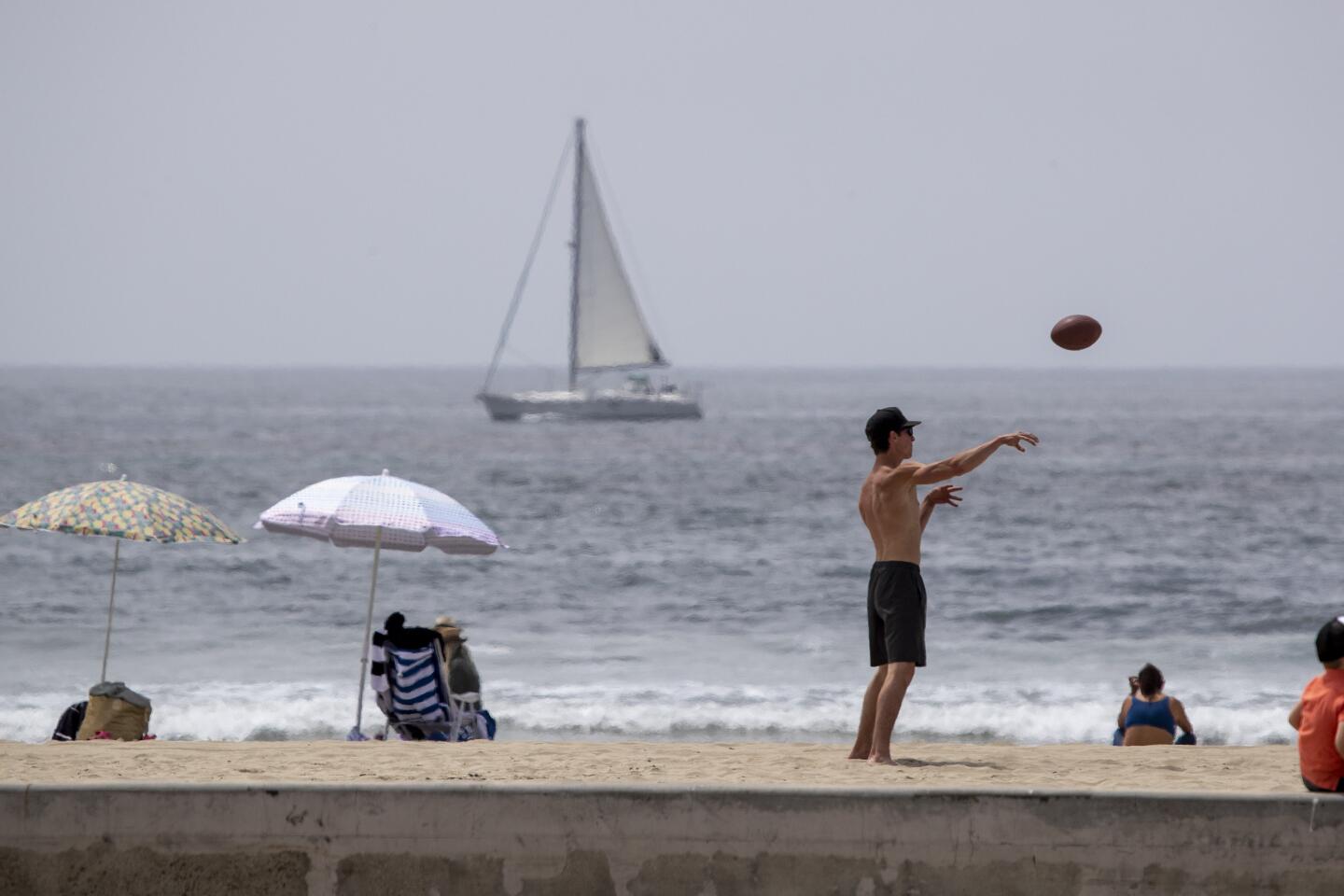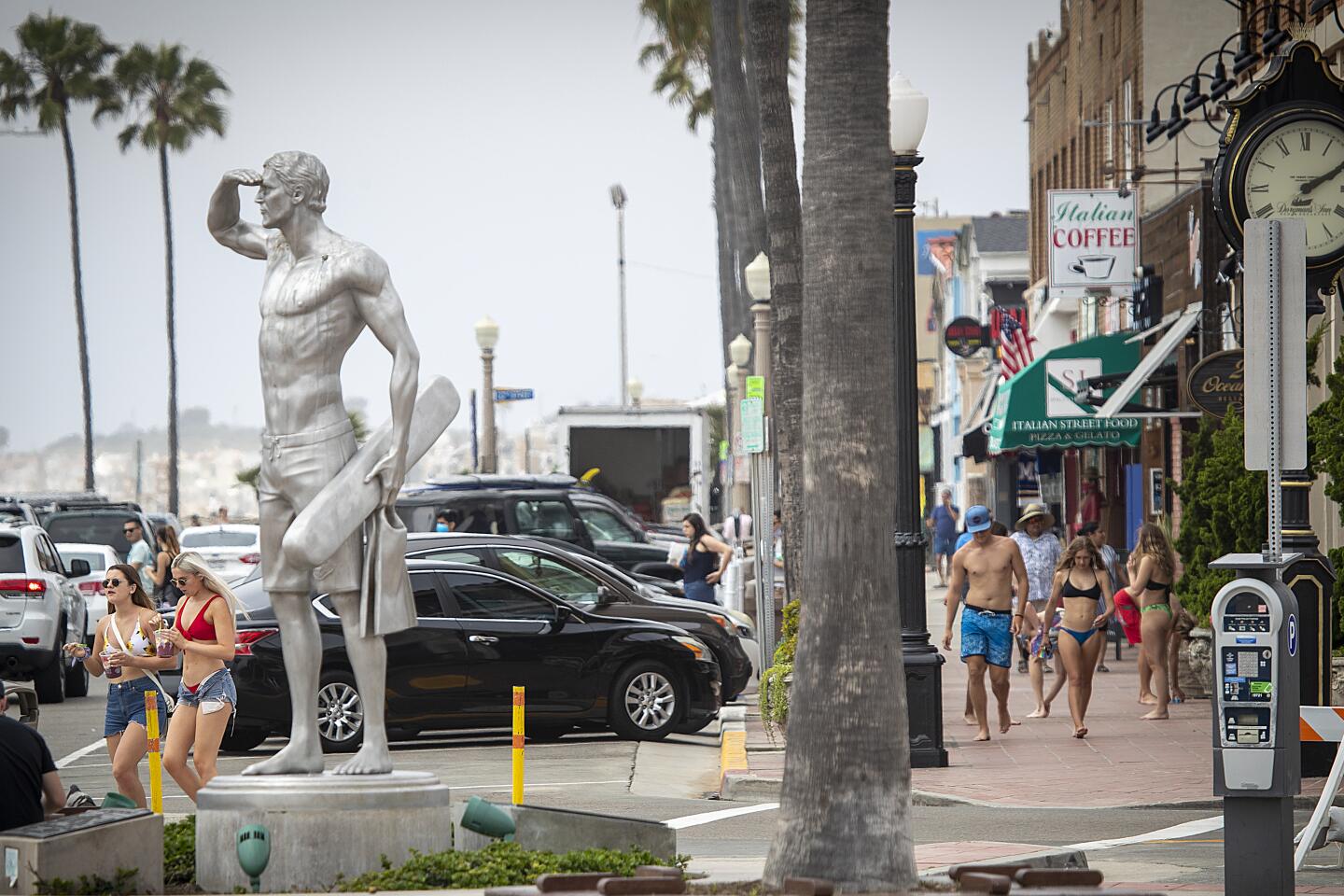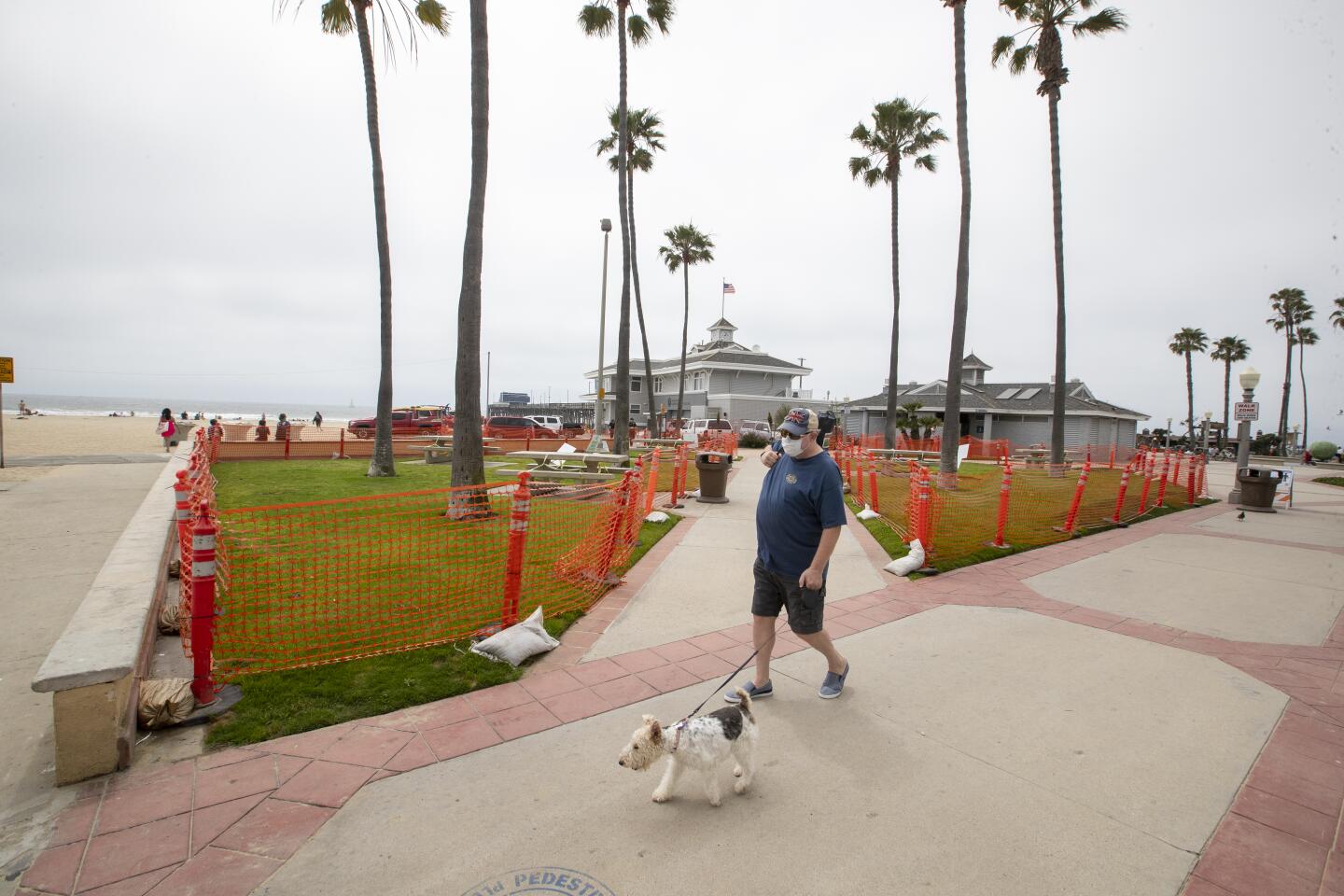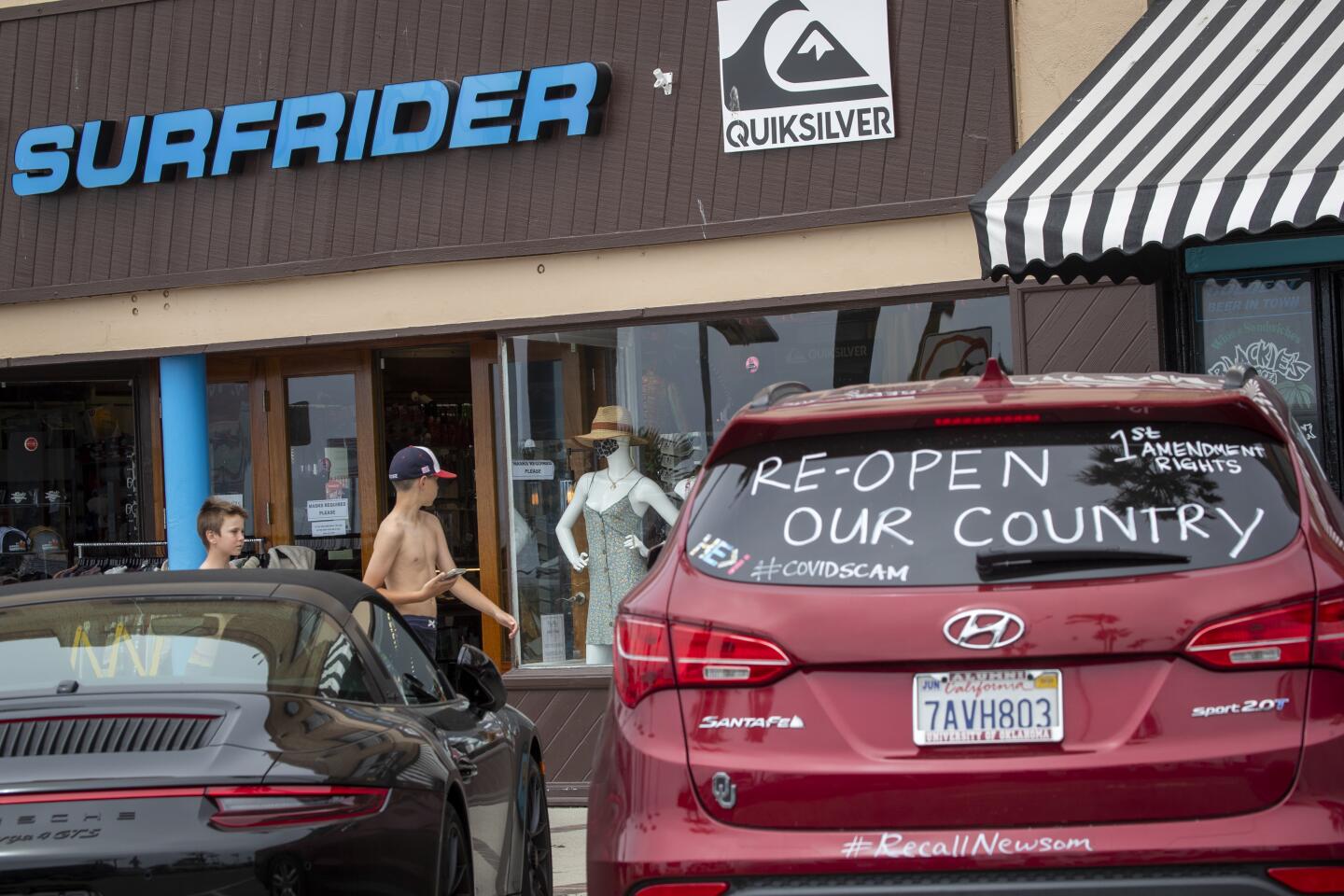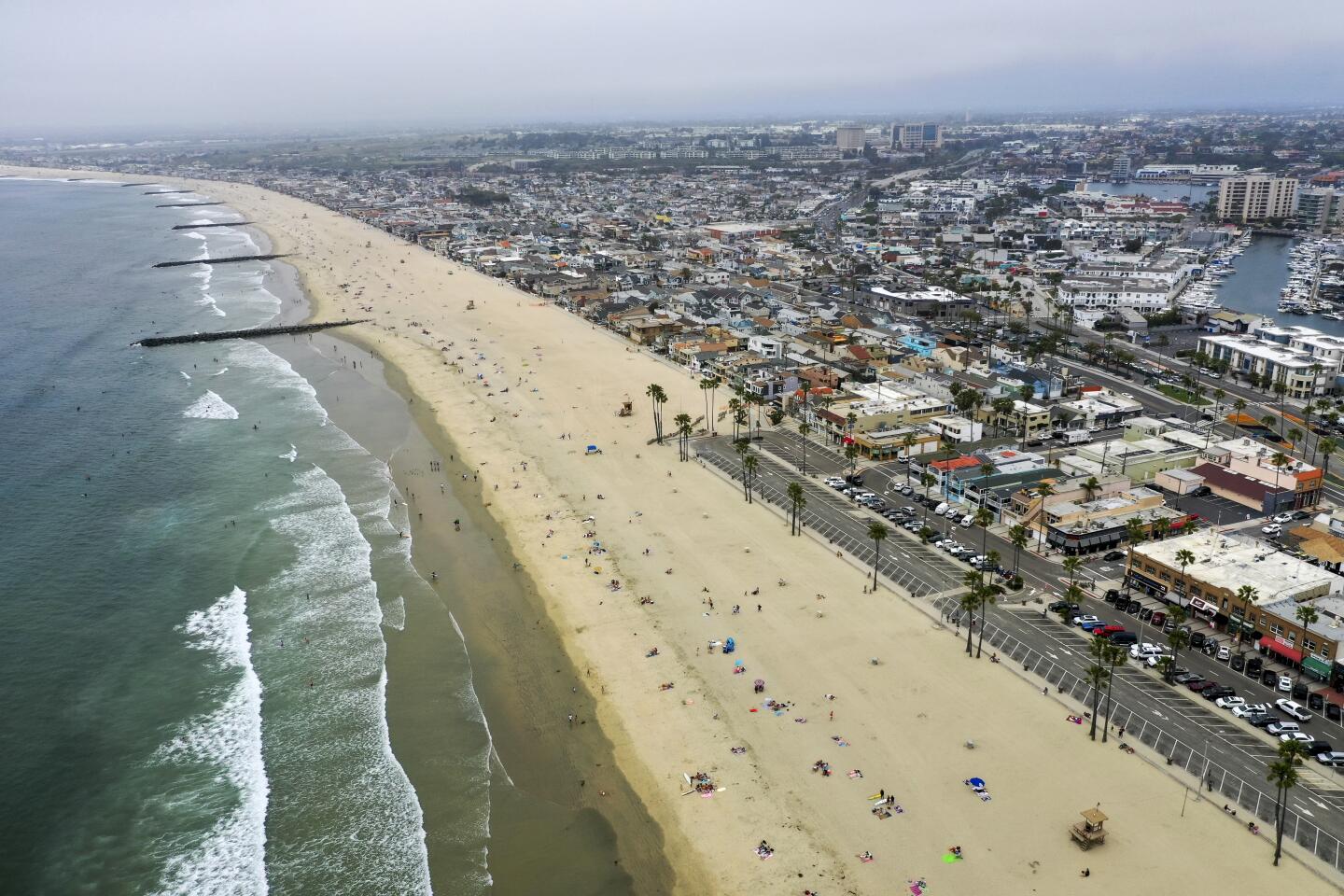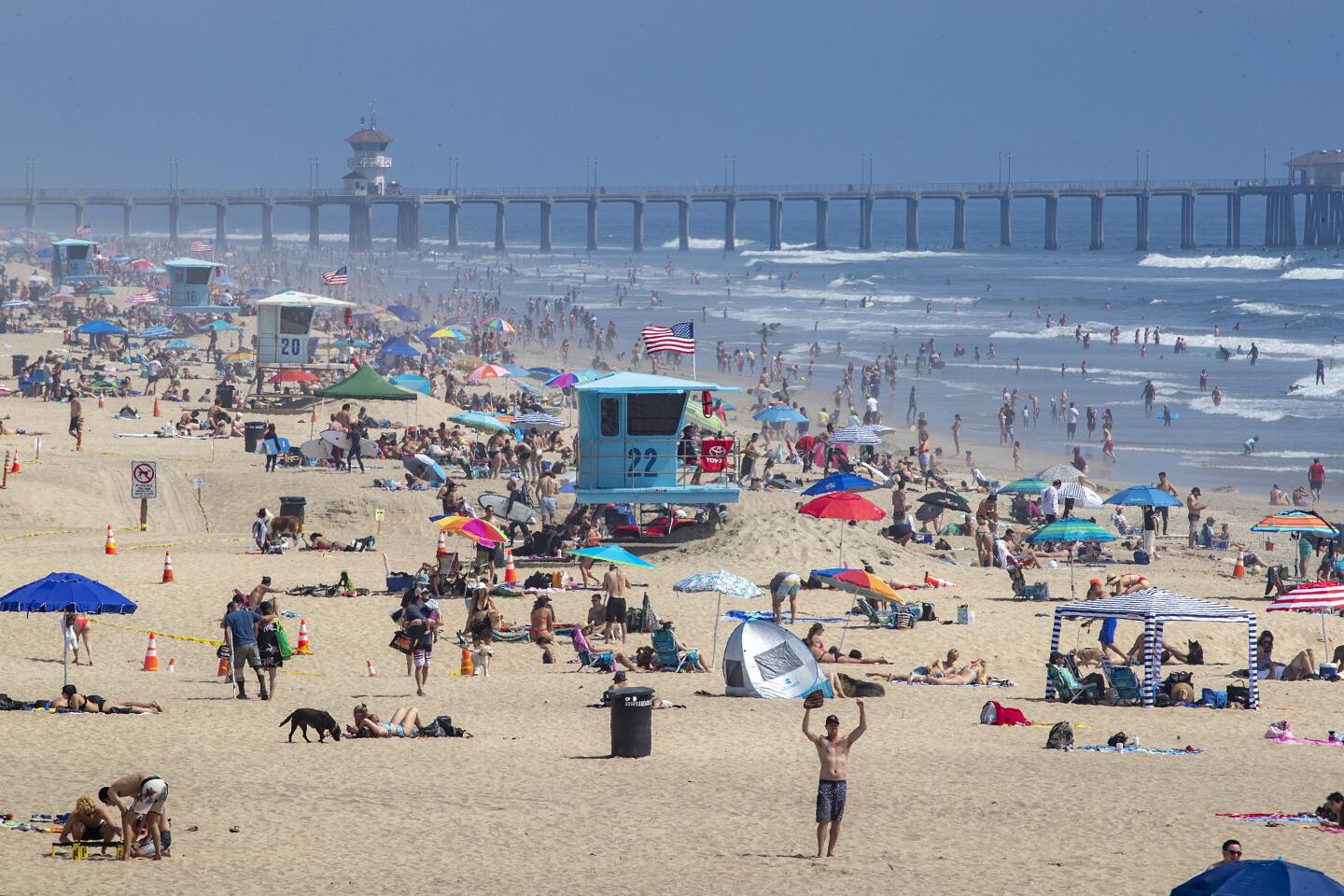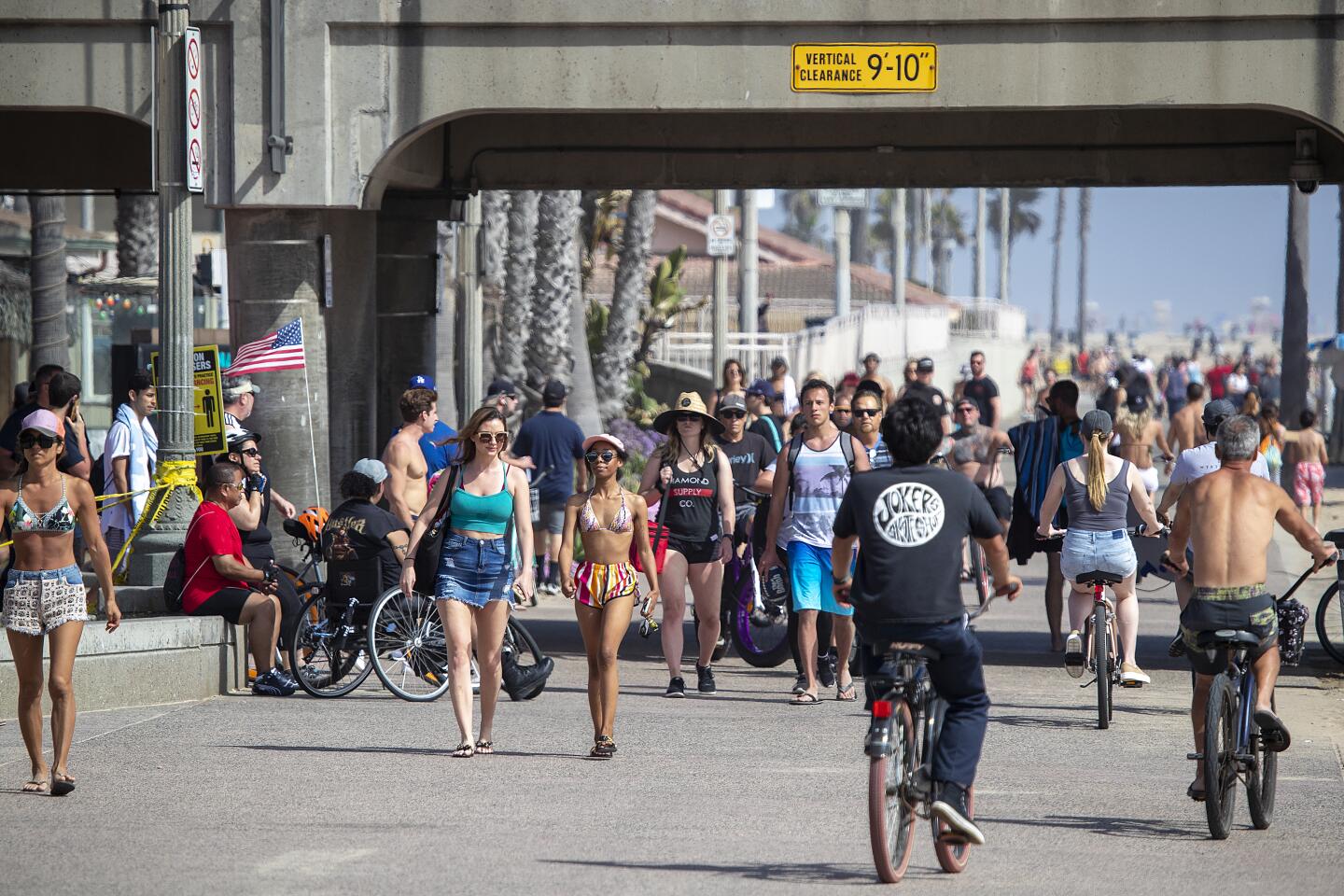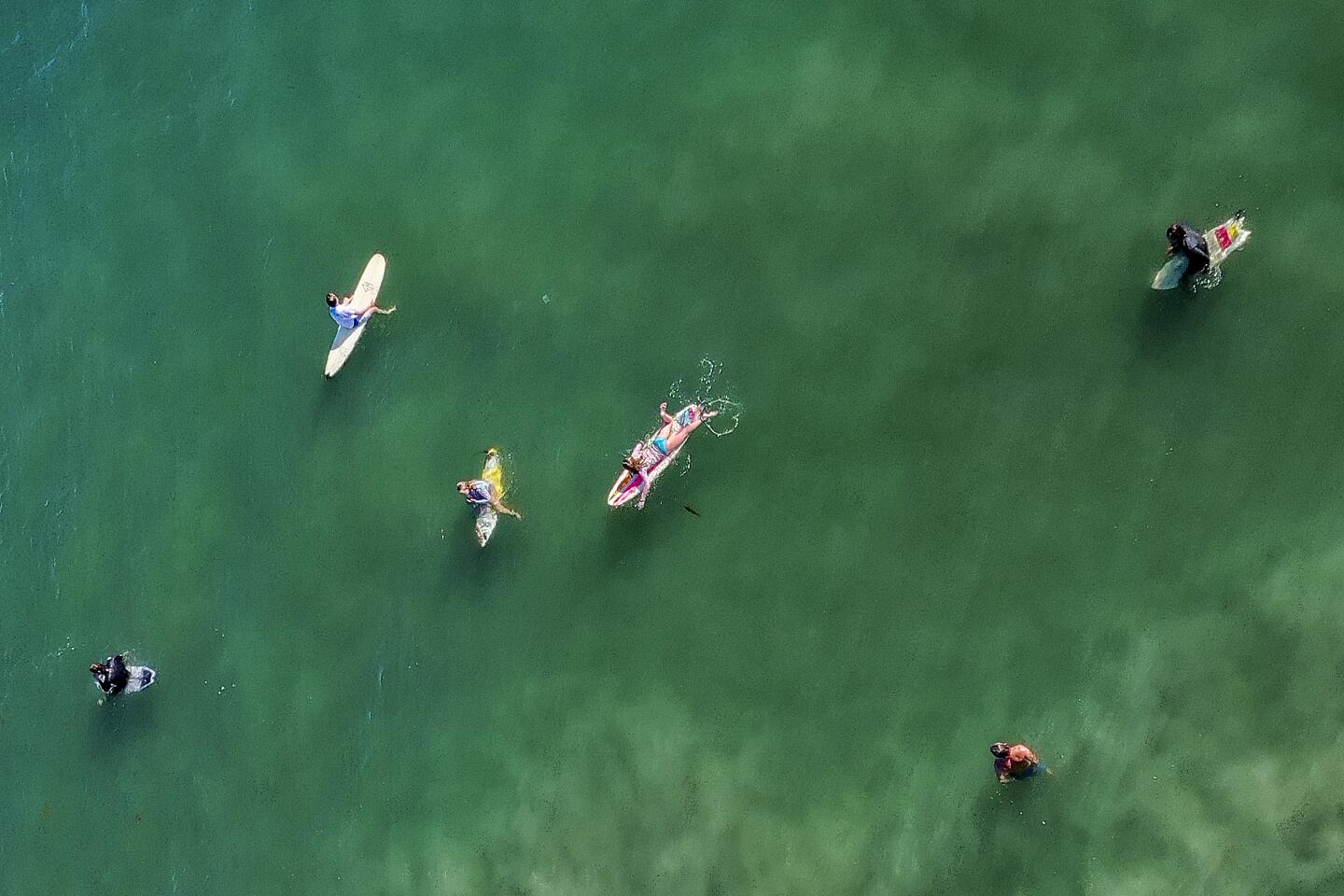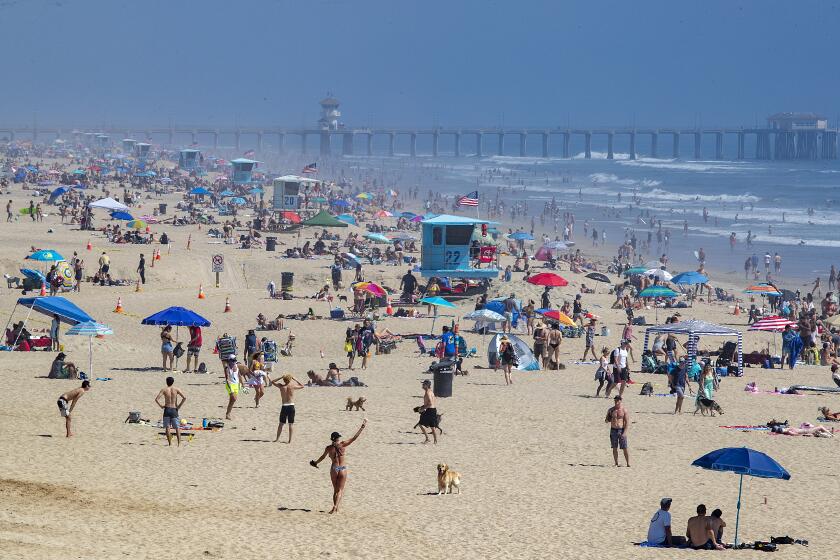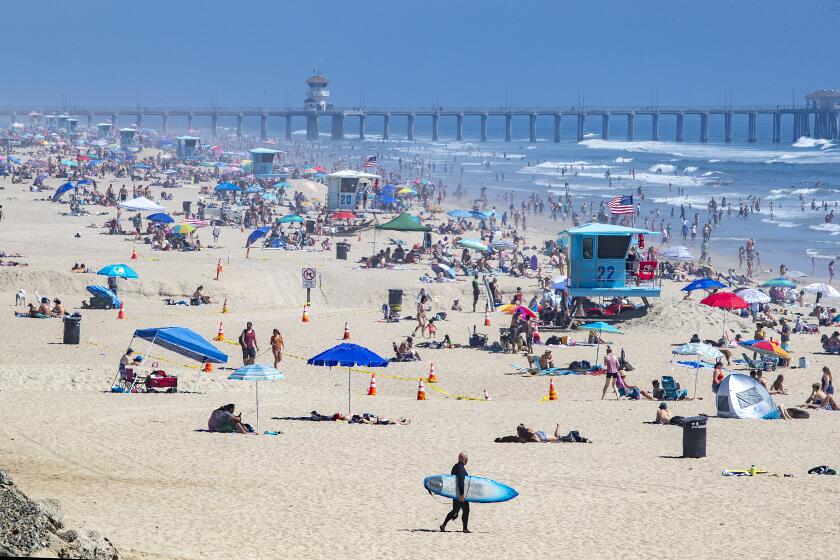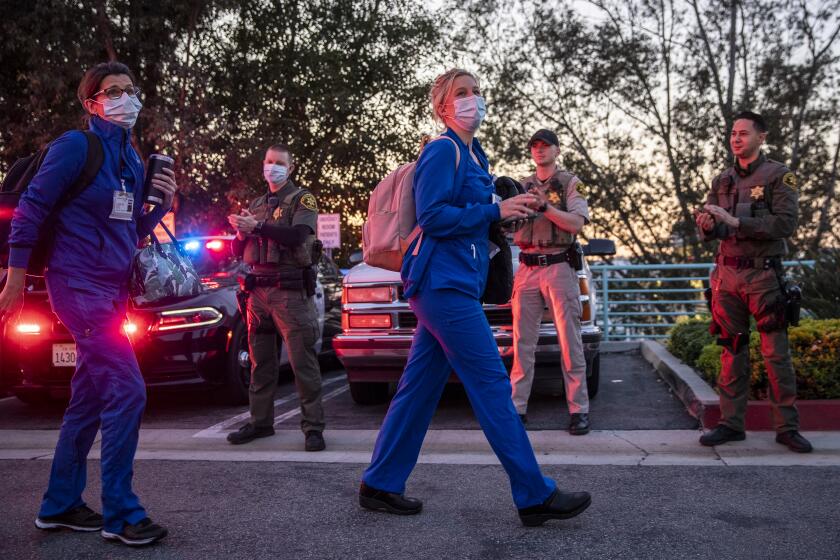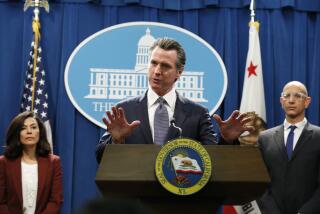After so many sacrifices, some Californians draw the line at closing beaches
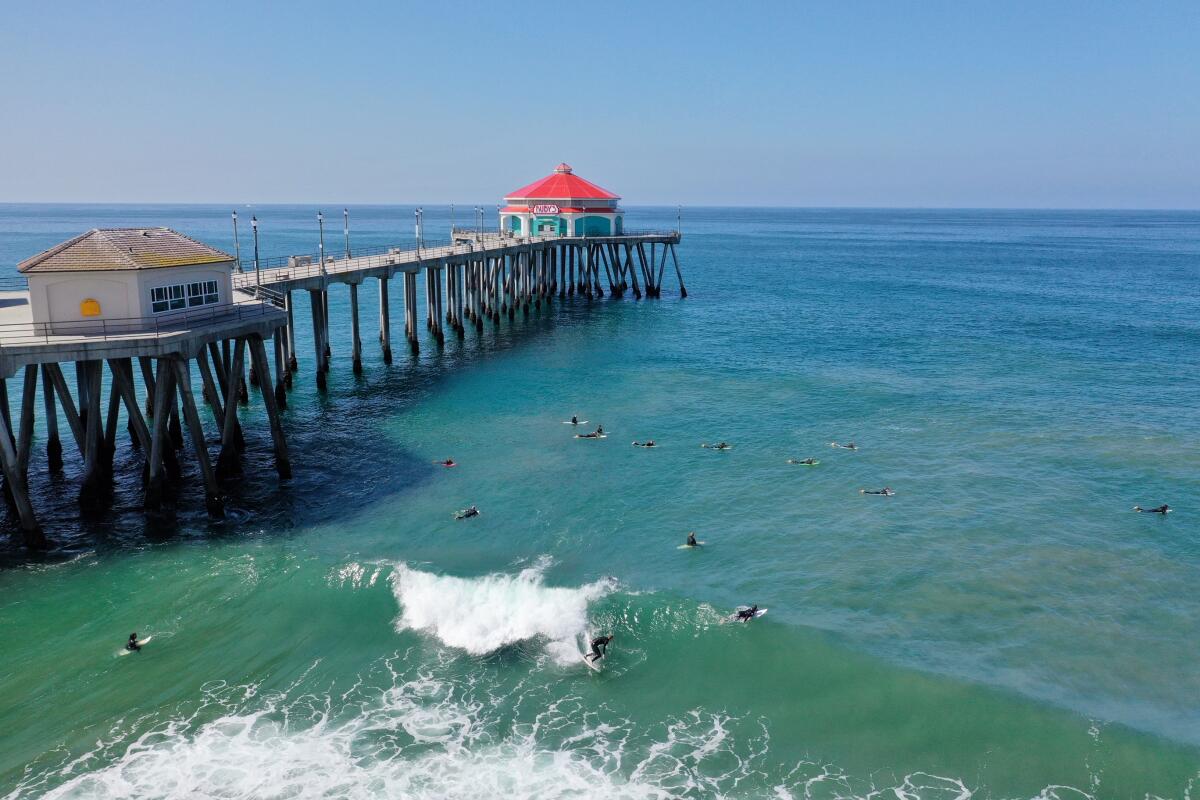
- Share via
Californians have made innumerable sacrifices in the face of the coronavirus crisis. They stopped working. They kept their children home from school. They have worn masks to the grocery store, canceled birthday parties, called off funerals.
And they have done so willingly, for the most part, successfully keeping the number of cases of COVID-19 and deaths much lower than in hot spots like New York and New Jersey.
But when Gov. Gavin Newsom on Thursday ordered a temporary “hard close” of all state and local beaches in Orange County despite the protests of elected officials, surfers and cooped-up people who just want to dip their toes in the sand after six weeks of stay-at-home orders, he touched a nerve in a state where a day at the beach is akin to a birthright.
As tensions rise over how and when to reopen the state, the beaches have become a flashpoint in a way some many other parts of life like shopping, working and cheering the Dodgers and Lakers have not. Newsom cracked down on the Orange County coastline at a critical moment, when some communities have begun pushing to loosen local restrictions.
Crowds flocked to Orange County beaches last weekend as a heatwave sent temperatures soaring above 90 degrees. Few wore masks. Photos of thousands of people lounging on the shoreline went viral.
Those images spurred Newsom to chastise Orange County beachgoers, saying their lack of physical distancing could prolong the spread of the novel coronavirus in California and put the health of others at risk.
“My job as governor is to keep you safe,” he said Thursday. “And when our health folks tell me they can’t promise that if we promote another weekend like what we had, then I have to make this adjustment. I hope it’s only a very short-term adjustment.”
Newsom said Orange County beaches would be reopened soon if the situation improves. But that did not satisfy county leaders and officials in some other coastal communities, who argue they should decide on shore restrictions based on local conditions. Orange County officials argue they had made progress in flattening the coronavirus curve, especially compared to neighboring L.A. County, and that a trip to the beach might do more good than harm.
“Medical professionals tell us the importance of fresh air and sunlight in fighting infectious diseases, including mental health benefits,” said Orange County Supervisor Don Wagner.
Until now, the delicate decision of whether to keep beaches open has been left to cities and counties, which must balance public health risks with providing equitable access to the outdoors.
Los Angeles County — the epicenter of the coronavirus crisis in California with more than 1,000 deaths — closed all 72 miles of its coastline. One fear about keeping Orange County beaches open is that residents from harder-hit counties would flock there, potentially spreading the virus.
Communities in the Bay Area have cracked down on those who violate the rules. San Mateo County officials ordered 275 people off Linda Mar Beach and threatened arrests and citations if people continued to violate the order. Local officials decided this week to close Lovers Point Beach along Monterey Bay due to overcrowding.
The chairman of the Coastal Commission, the gatekeeper of California’s beach access law, said he supported Newsom’s decision regarding Orange County beaches.
In a statement Thursday, Steve Padilla said that while he recognized beachgoers would be disappointed, the threat of coronavirus spreading remains very real. In March, Padilla was one of the first state officials to announce that he had tested positive for the disease.
The news comes after a memo saying California’s governor would go further, closing all state and local beaches and parks, a plan he appeared to abandon.
“I had COVID-19, was hospitalized for three weeks and in ICU on a ventilator for eleven days fighting for my life, so take it from me — we need to listen to the governor and stay home until it’s safe,” Padilla said. “Our coast is a precious resource for all of us but today we should remember what’s most precious — life itself and the health of our communities.”
The pandemic has upended Californians’ relationship with their vaunted coastline. For many, being near the water is healing, especially in times of great stress.
Jennifer Savage, California policy manager for Surfrider Foundation, acknowledged the urgent need to protect the community, as well as the challenges that state and local officials face in navigating the conflict between those who are respecting public health guidelines and those who are not.
“It really shows the importance of taking responsibility as individuals,” she said. “If the beach is crowded, don’t go. If you do go to the beach, keep moving, wear a mask, do all the things to make sure that the beach can be open and be the resource that we all want it to be.”
Southern California had its first big heat wave over the weekend, but L.A. County beaches are closed due to the coronavirus pandemic. Beaches in nearby counties were open, however. Here are a few scenes from the weekend.
Adding to the debate over opening beaches are statements by President Trump that warmer weather could help slow the spread of COVID-19. Experts, however, say there’s little evidence that sunnier days make beaches safer.
Dr. Amesh Adalja, an infectious disease specialist at Johns Hopkins University, said that “while it is true that the UV radiation contained in sunlight is detrimental to the [virus’s] viability on surfaces, many beach activities would give the virus an opportunity to pass — not from surfaces — but from person to person.”
Andrea Armani, a professor of chemical engineering and materials science at the University of Southern California, said people also are less likely to wash their hands at the beach or to wear masks.
The governor’s announcement about Orange County beaches came after reports that he would go even further, mandating the closure of all state and local beaches — a plan he appeared to abandon.
Orange County public health officials reported 145 new coronavirus cases Thursday — the largest single-day increase since the pandemic began — bringing the county’s total case count to 2,393.
On Wednesday evening, a California Police Chiefs Assn. memo sent to local police chiefs said Newsom intended to make an announcement on Thursday about closures of all state and local beaches. A law enforcement source confirmed to The Times that authorities were briefed on the plans, which they were told might also include the closure of some parks.
On Thursday, Newsom said the memo to the police chiefs “never got to me,” and he denied rescinding plans for an order to close beaches statewide.
“We’ve been consistent,” Newsom said. “I can’t square what others may have said, but this is what we’ve said.”
In the face of mounting pressure from frustrated surfers and beachgoers, Newsom danced delicately around the issue and did not outright address the highly anticipated closures until more than 20 minutes into his daily COVID-19 briefing.
There were “outstanding examples” of carefully managed beaches in L.A., San Diego, Mendocino and Sonoma counties, as well as the Bay Area, he began. But in Orange County, he said, images of crowded beaches were “disturbing” and “raised alarm bells.”
Orange County leaders are pushing back.
San Clemente Mayor Pro Tem Laura Ferguson said she reached out to the city manager and city attorney Wednesday night after she heard about the proposed order, suggesting they review what legal authority the governor had to close city beaches.
“I’m hoping the governor can cite some valid reason under case law to be doing this to cities because, in my opinion, it appears to be government overreach. Local beaches are under the control of the cities, not the state.”
After a roughly two-week closure imposed at San Clemente beaches, the city reopened its sandy stretches last weekend with the caveat that visitors would only be permitted to run, walk, swim, surf or partake in other activities while along the coast. Sunbathing or sitting on the sand was not permitted.
In Newport Beach, Police Chief Jon Lewis and Fire Chief Jeff Boyles said in a joint statement that while there were some people crowded together too closely on the beach, most were practicing social distancing or sitting with their families.
The departments also shared aerial photos captured Saturday afternoon that showed sparse crowds on the city’s beaches.
In Huntington Beach, the City Council was holding an emergency meeting to discuss next steps, including possible litigation. Late Thursday, the council voted to seek an injunction against Newsom’s order.
“We are both concerned and disappointed with the actions taken today by Gov. Newsom and the state of California,” Mayor Lyn Semeta said in a statement.
The city, she said, had worked to discourage overcrowding at the beaches and to keep them safe so residents “can experience physical and mental health benefits from accessing the Pacific Ocean.”
“Our experience here locally,” she said, “has been that most people are being responsible and complying with social distancing, and given that Orange County has among the lowest per-capita COVID-19 death rates in California, the state’s action today seems to prioritize politics over data.”
Times staff writers Amina Khan, Luke Money, John Myers and Richard Winton contributed to this report.
More to Read
Sign up for Essential California
The most important California stories and recommendations in your inbox every morning.
You may occasionally receive promotional content from the Los Angeles Times.
